Datasets

Medical Same Day Emergency Care (SMDEC) services review almost half of all unplanned attendances requiring medical review. Activity has risen sharply, with monthly MSDEC admissions increasing...
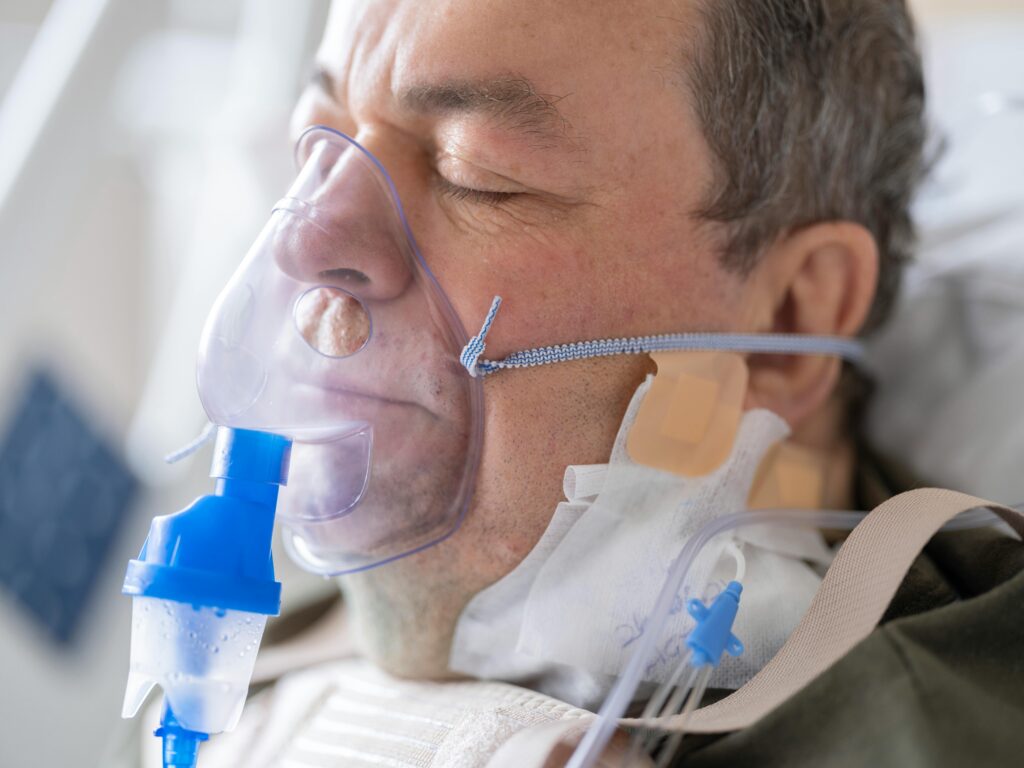
This PIONEER-curated dataset comprises 390K Acute Medical Emergency Department admissions recorded between 2020 and 2024 for patients aged 65+. The data is structured...

There is increasing interest in care pathways for acute exacerbations of disease that are safe and avoid hospital admission. A...

Asthma is common disease and can be life threatening. Exacerbations of asthma are one of the leading causes of unplanned...

There is increasing interest in care pathways for acute exacerbations of disease that are safe and avoid hospital admission. A...

Medical Same Day Emergency Care (SMDEC) services review almost half of all unplanned attendances requiring medical review. Activity has risen...

This PIONEER-curated dataset comprises 1,335,540 Acute Medical Emergency Department admissions recorded between 2020 and 2024. The data is structured to...

Asthma remains a significant clinical and public health challenge for the NHS, affecting millions and contributing to substantial morbidity, healthcare...

The Society for Acute Medicine (SAM) Benchmarking Audit (SAMBA) is a national benchmark audit of acute medical care. The aim...

The Society for Acute Medicine (SAM) Benchmarking Audit (SAMBA) is a national benchmark audit of acute medical care. The aim...

The Winter Society for Acute Medicine Benchmarking Audit (SAMBA) 2020 provides a snapshot of the care provided for acutely unwell...

The Society for Acute Medicine (SAM) Benchmarking Audit (SAMBA) is a national benchmark audit of acute medical care. The aim...

The Society for Acute Medicine (SAM) Benchmarking Audit (SAMBA) is a national benchmark audit of acute medical care. The aim...

The Summer Society for Acute Medicine Benchmarking Audit (SAMBA) 2022 provides a snapshot of the care provided for acutely unwell...

The Summer Society for Acute Medicine Benchmarking Audit (SAMBA) 2023 provides a snapshot of the care provided for acutely unwell...

The Society for Acute Medicine (SAM) Benchmarking Audit (SAMBA) is a national benchmark audit of acute medical care. The aim...

The Society for Acute Medicine (SAM) Benchmarking Audit (SAMBA) is a national benchmark audit of acute medical care. The aim...

Approximately 10% of the population have a self-reported allergy label. The symptoms causing patients to label themselves as being allergic...

Community acquired pneumonia (CAP) is a common causes of hospital admission with admission rates rising, especially in more socioeconomically deprived...

Up to 30% of older adults (aged 65 years and older) have been diagnosed with Diabetes mellitus. Older diabetics are...

This dataset includes 24,783 older people (aged 65 years and older) and 29,333 spells, designed to support research which improves...

Headaches are common and often do not require hospitalisation. However, headaches account for 1–4% of all emergency department visits and...
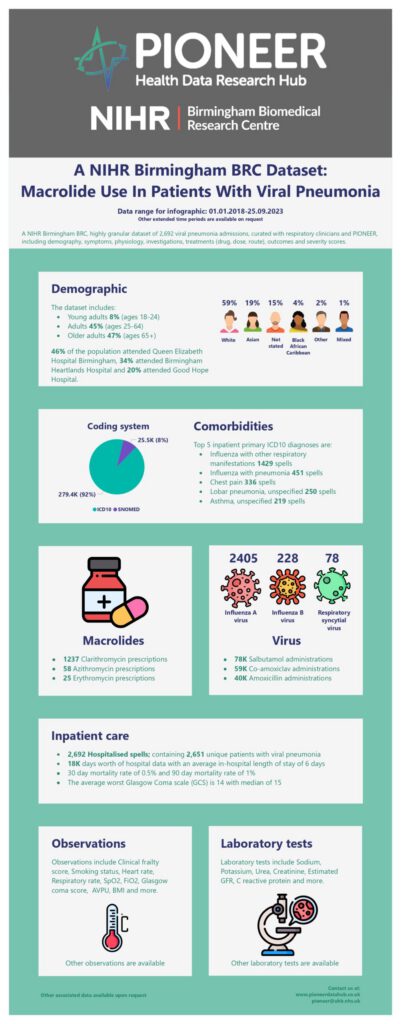
Viral pneumonia is common, caused by a variety of pathogens including seasonal influenza and respiratory syncytial virus. Secondary bacterial infections...
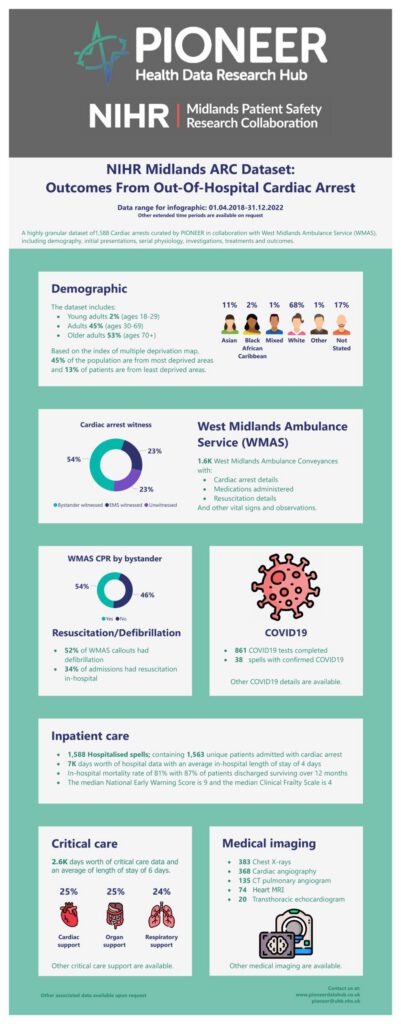
Resuscitation to Recovery is the national framework to improve care of people with Out of hospital cardiac arrests (OHCA). Despite...
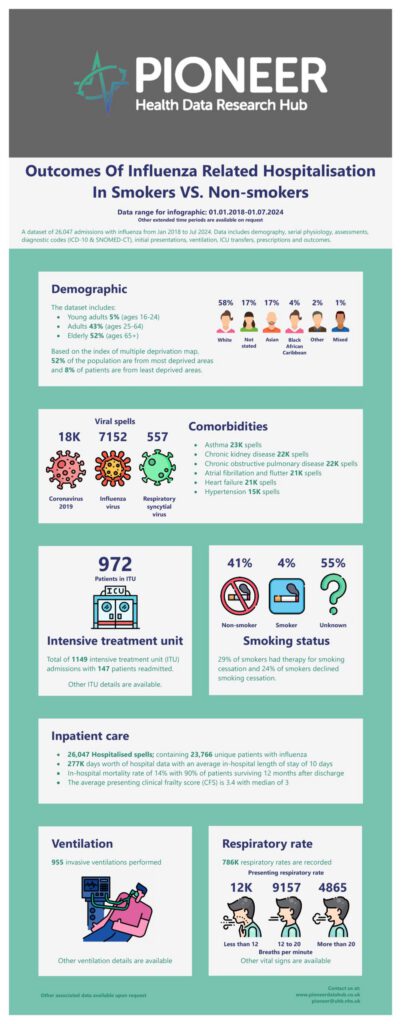
Smoking is a leading preventable cause of chronic diseases like circulatory disease, cancer, and chronic lung conditions, worsening outcomes in...
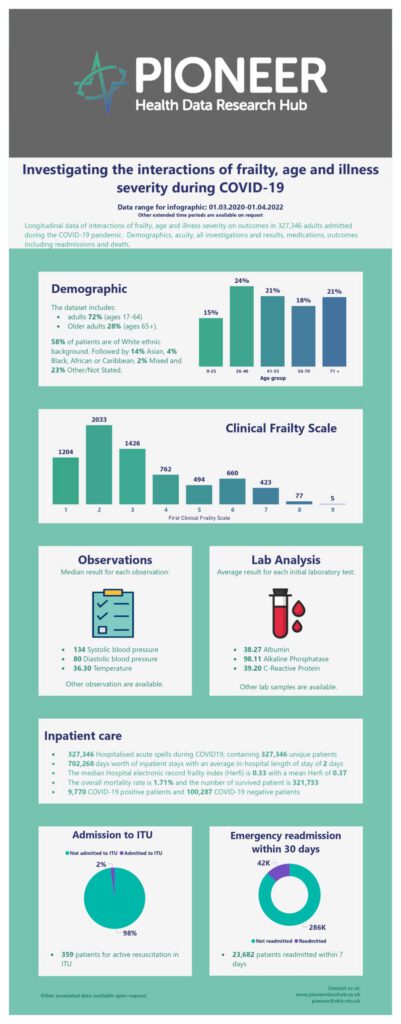
Frailty is a syndrome of increased vulnerability to incomplete resolution of homeostasis (healing or return to baseline function) following a...
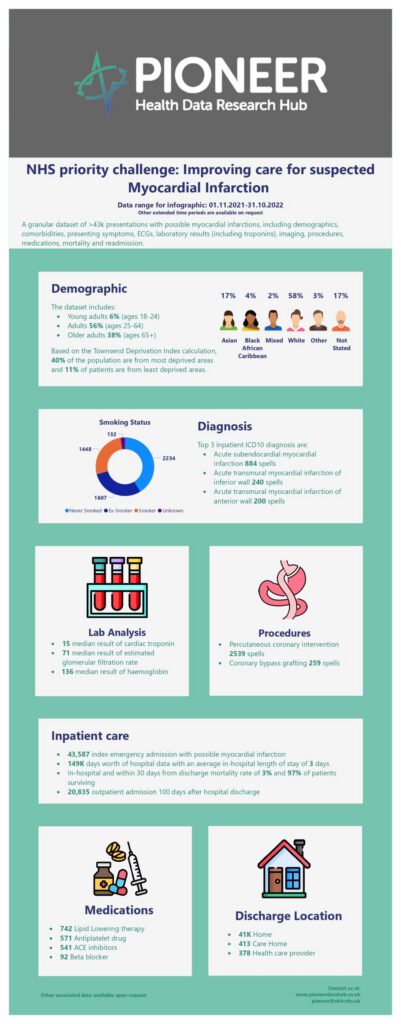
The NHS long term plan highlights the need for better care for common long-term conditions. With advances in prevention and...
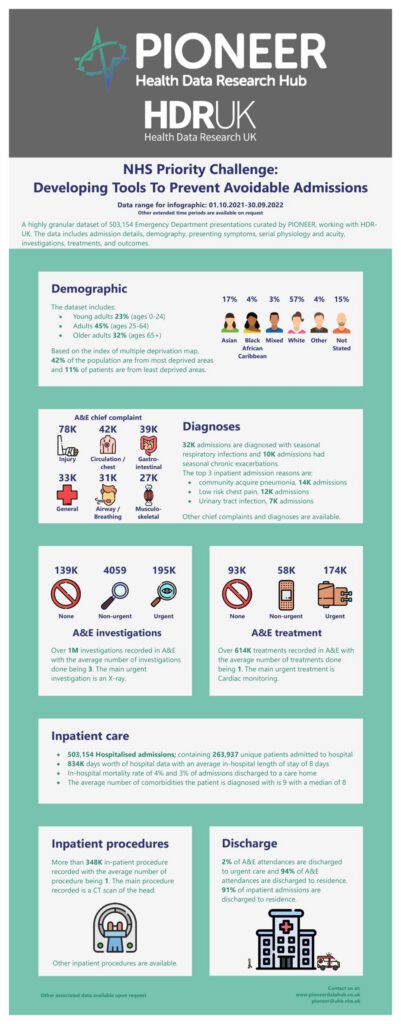
The NHS long term plan includes prioritising work to avoid hospital admissions. Emergency admissions are costly and frequently unpleasant experiences for...
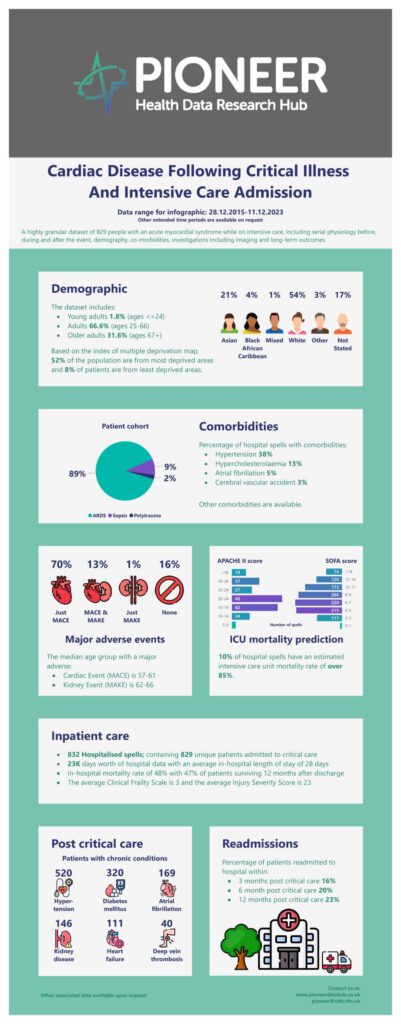
Clinical studies have suggested a link between critical illness and cardiac events. Pre-clinical research has also suggested that critical illness...
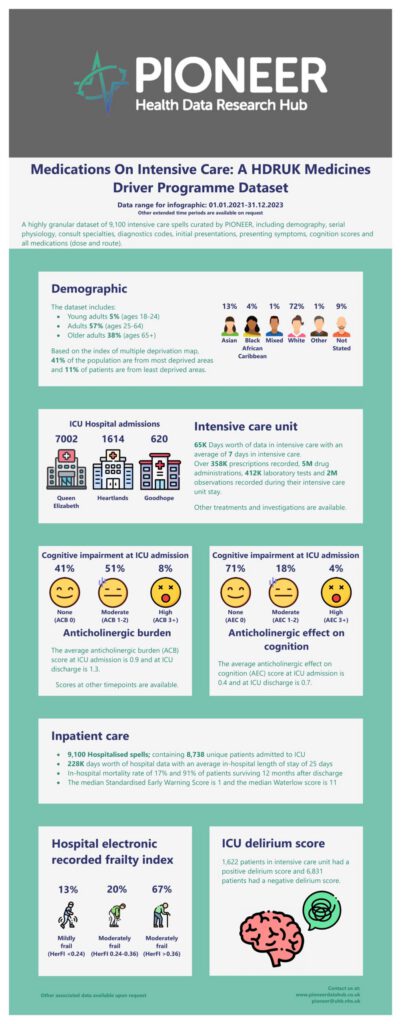
Delirium is a clinical syndrome of acute confusion which is particularly common in critically ill Intensive Care patients. Delirium on...
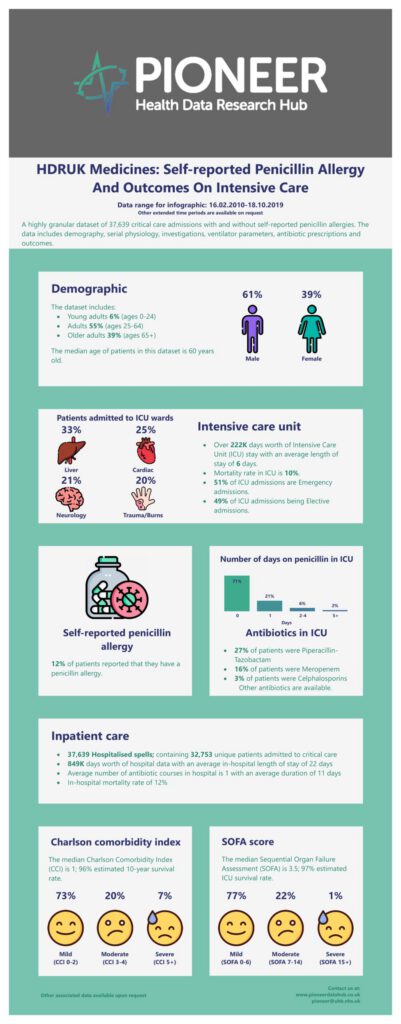
Approximately 10% of the population have a penicillin allergy label which is mostly self-reported. The symptoms causing patients to label...
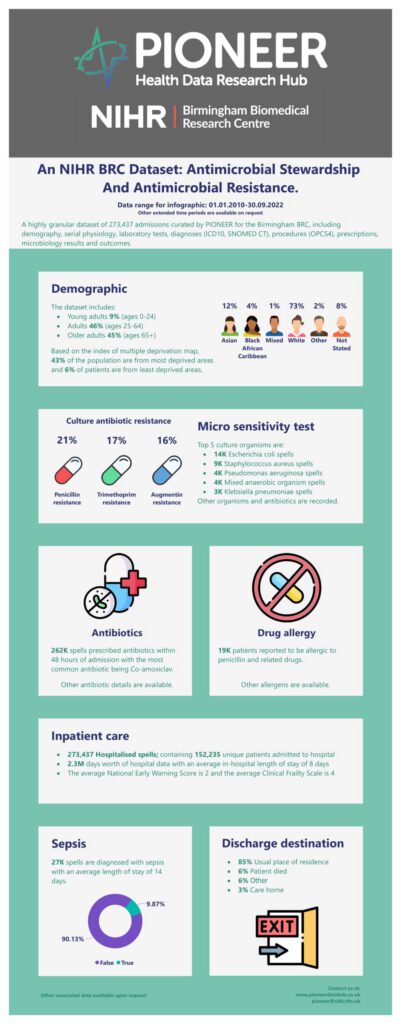
Tackling antimicrobial resistance is a priority for the World Health Organisation and national governments. A challenge driving resistance is the...
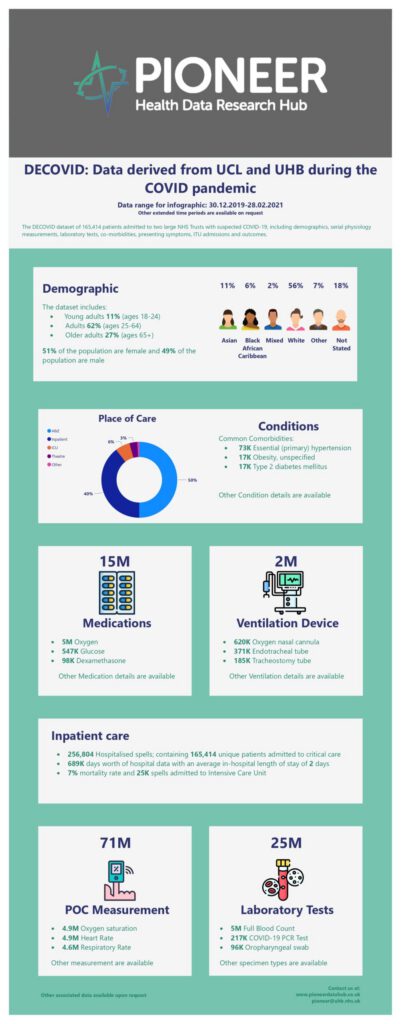
DECOVID, a multi-centre research consortium, was founded in March 2020 by two United Kingdom (UK) National Health Service (NHS) Foundation...

This synthetic dataset includes 16,276 patients admitted for drug overdose from 2016 to 2022, featuring comprehensive patient demographics, comorbidities coded...
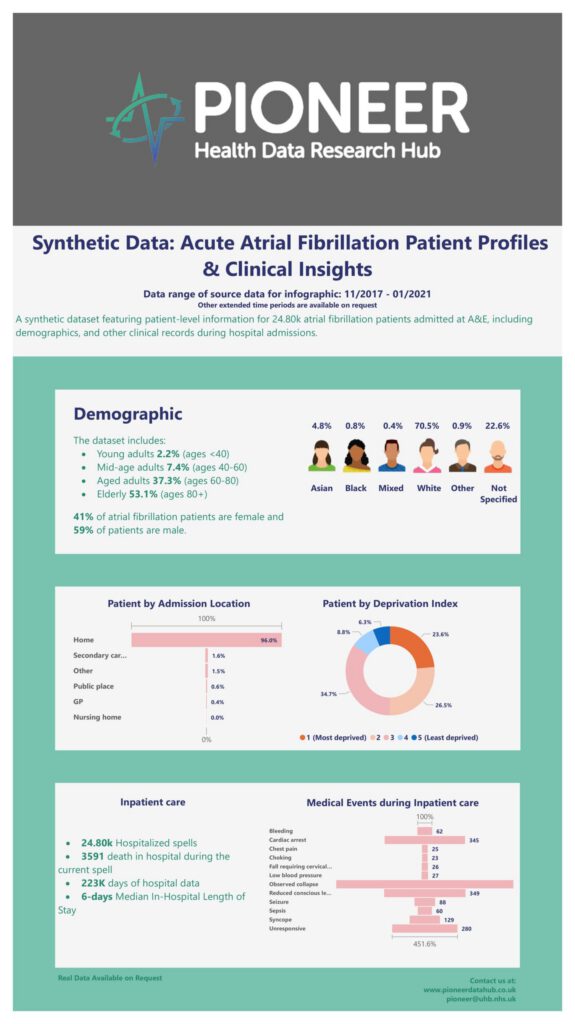
Atrial fibrillation (AF) is a common abnormal heart rhythm that causes the heart to beat irregularly and often too fast....
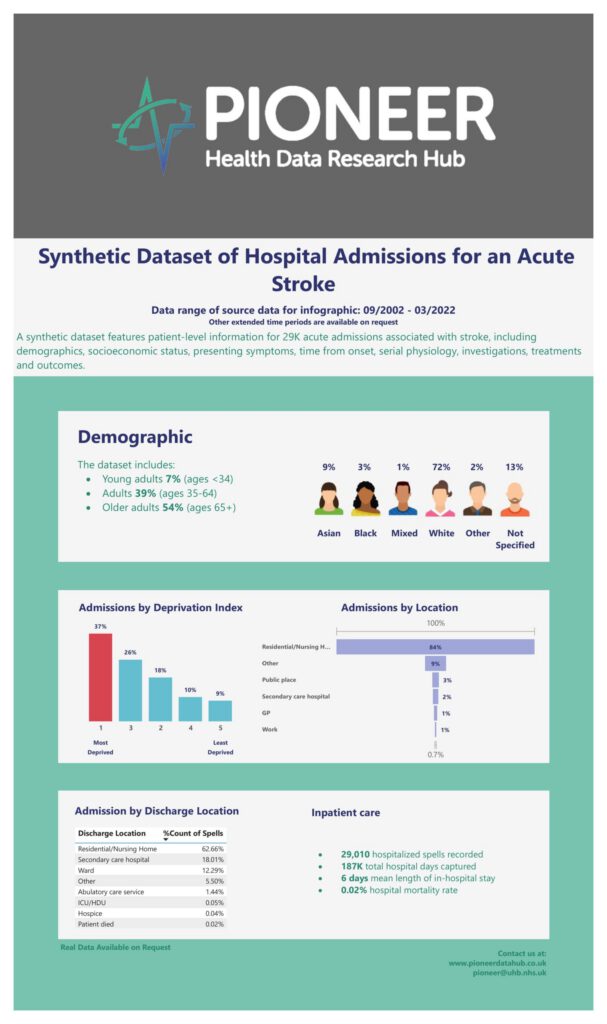
Strokes can be ischaemic or haemorrhagic in nature, leading to debilitating symptoms which are dependent on the location of the...
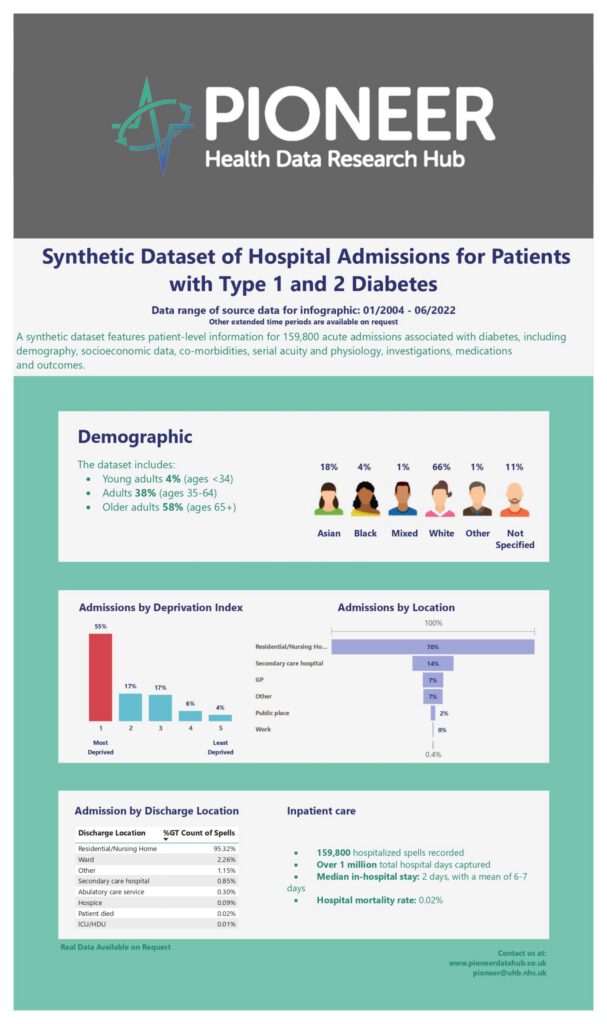
Type 1 Diabetes is an autoimmune disease impacting on insulin production. Type 2 Diabetes is caused by insulin resistance. Both...
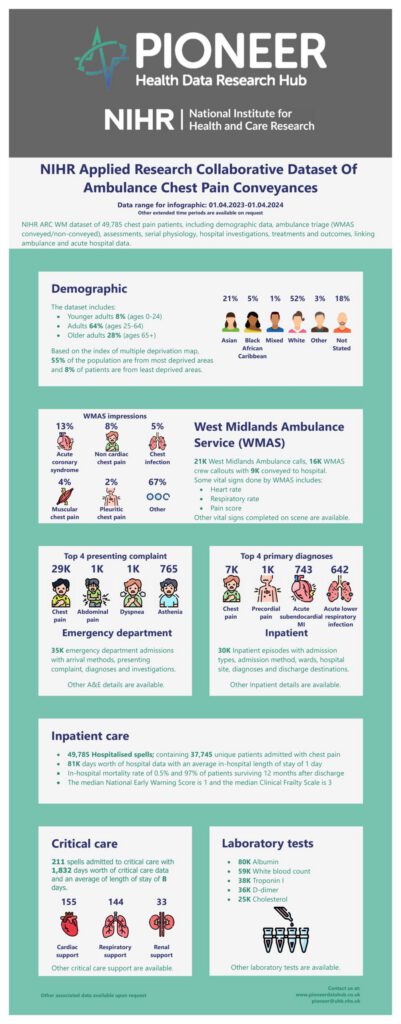
A highly granular dataset of 49,785 Chest pain admissions for patients calling West Midlands Ambulance Service or presenting directly to...
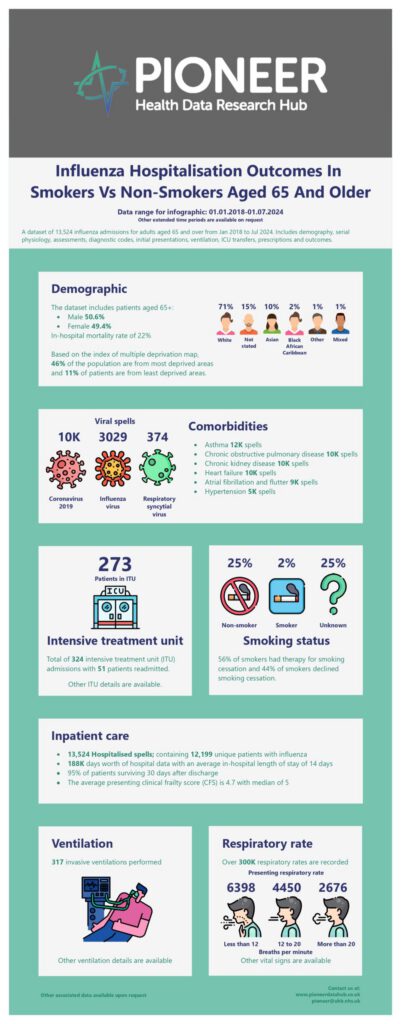
Smoking is a leading preventable cause of chronic diseases, including circulatory disease, cancer, and chronic lung conditions, and worsens outcomes...
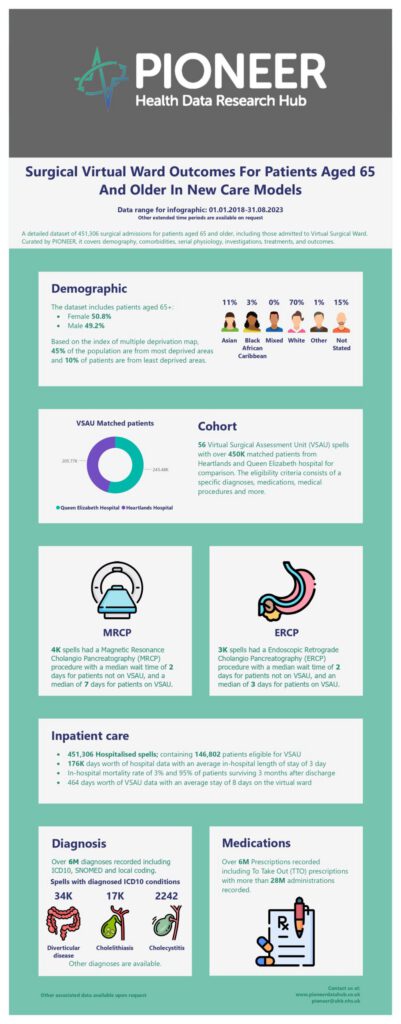
Virtual wards provide care at home with remote monitoring for people who do not need admission to hospital, but require...
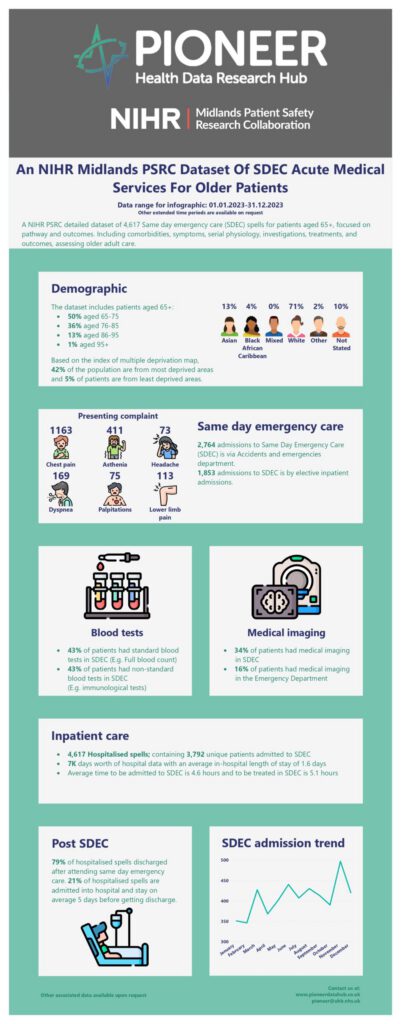
Emergency care services face increasing pressure. NHS England (NHSE) has prioritised pathways for patients which avoid admission, including Same Day...
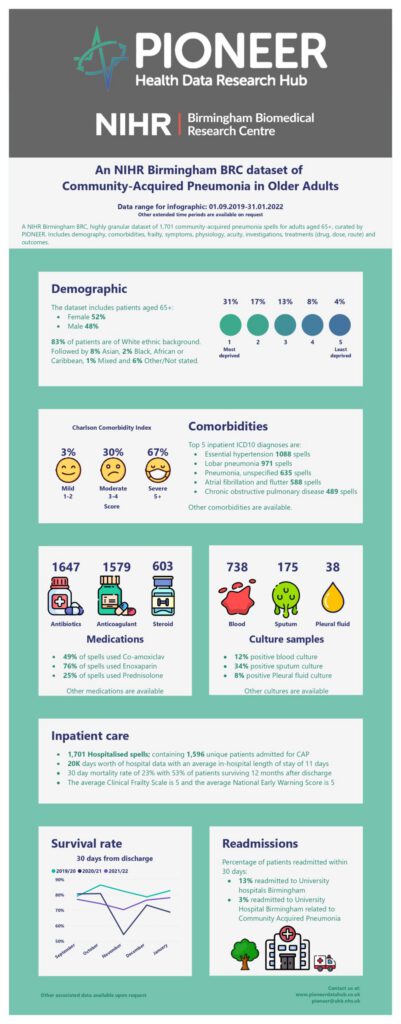
Community acquired pneumonia (CAP) is a leading cause of hospital admission and has high rates of mortality and complications, especially...
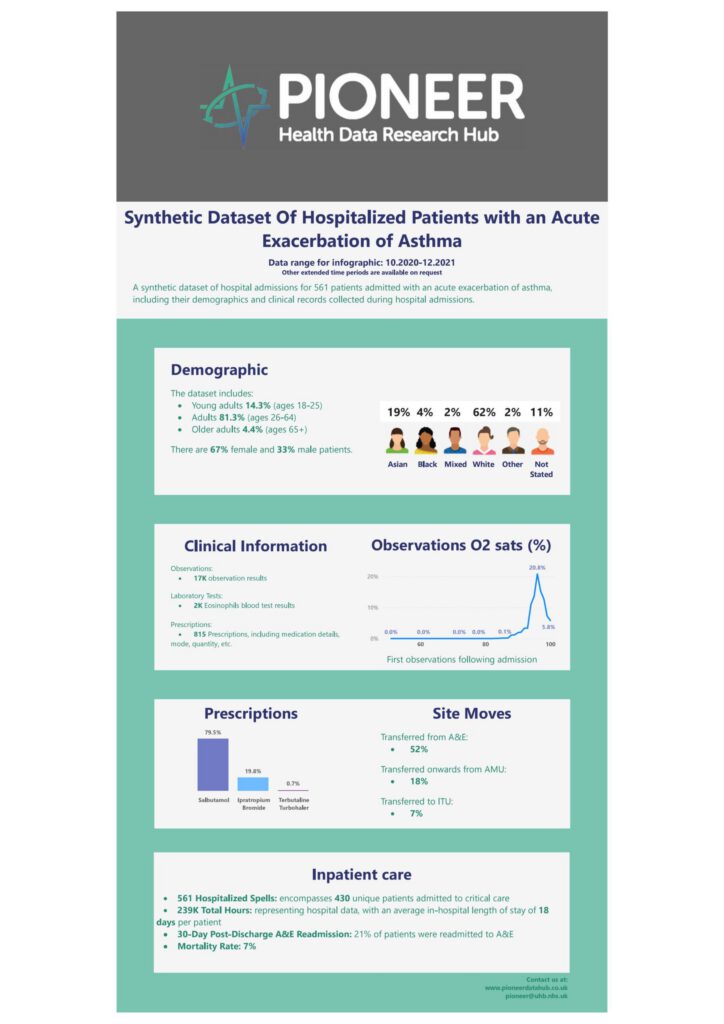
To support respiratory research, a synthetic asthma dataset was generated based on a real-world data, originally documenting 381 patients with...
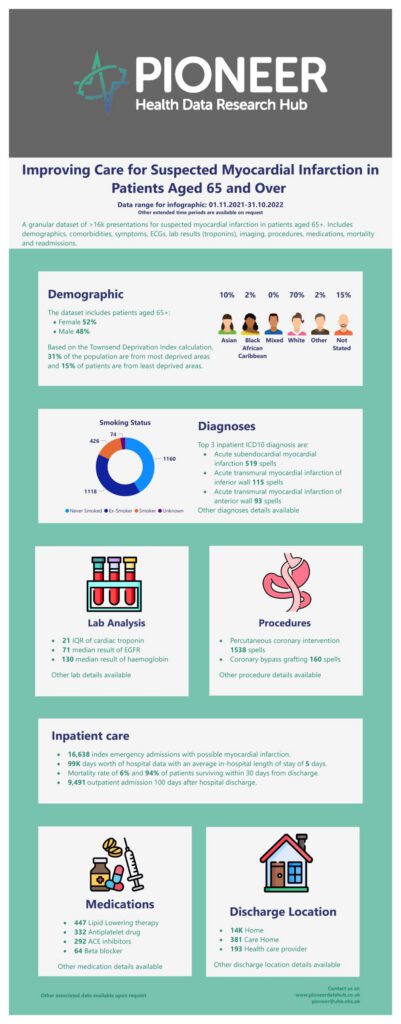
The NHS long term plan highlights the need for better care for common long-term conditions. With advances in prevention and...
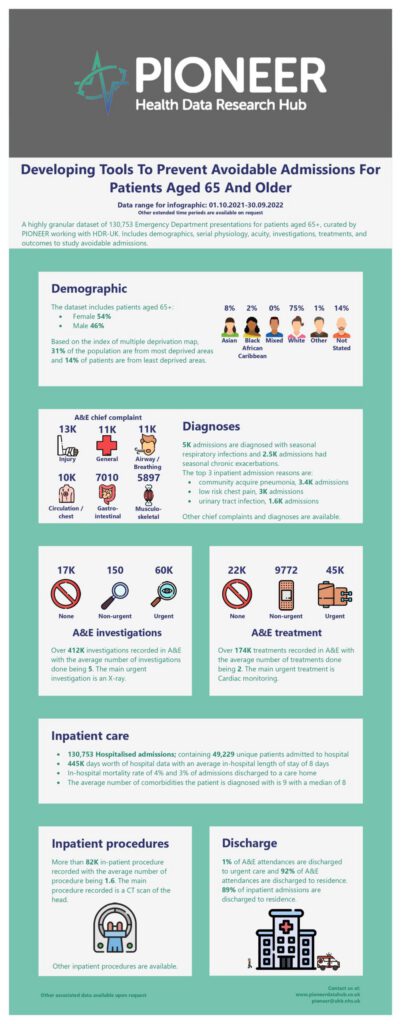
The NHS long term plan includes prioritising work to avoid hospital admissions. Emergency admissions are costly and frequently unpleasant experiences for...
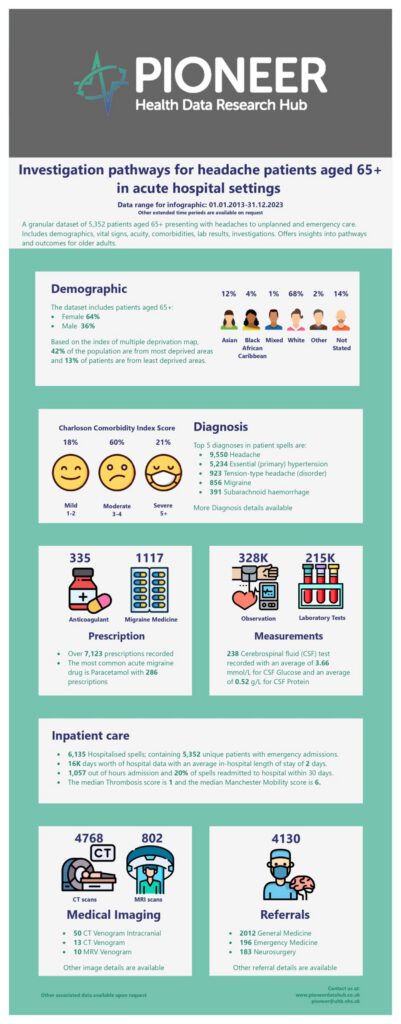
Headaches are common and often do not require hospitalisation. However, headaches account for 1–4% of all emergency department visits and...
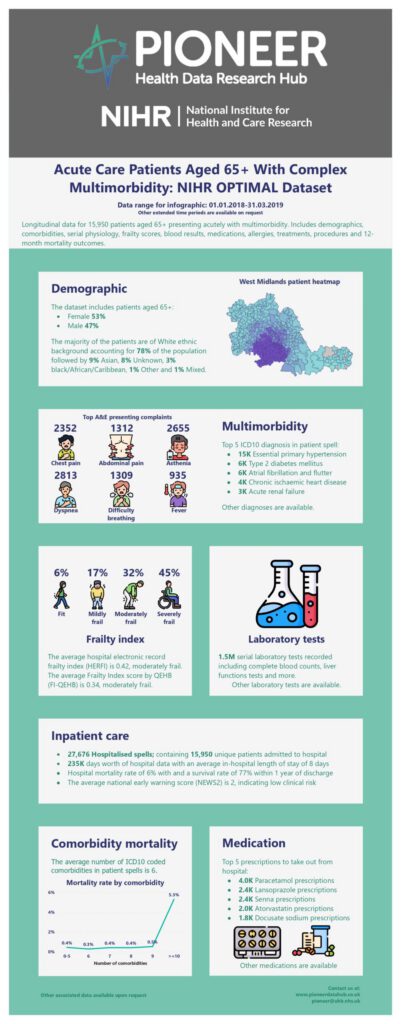
This dataset forms part of the OPTIMising therapies, discovering therapeutic targets and AI-assisted clinical management for patients Living with complex...
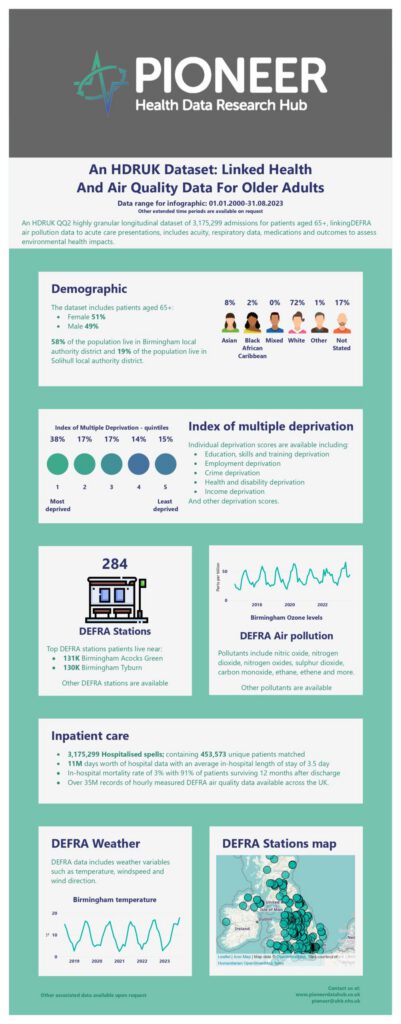
The environmental determinants of health are increasingly recognised with descriptions of higher hospital admissions and poorer outcomes for patients during...
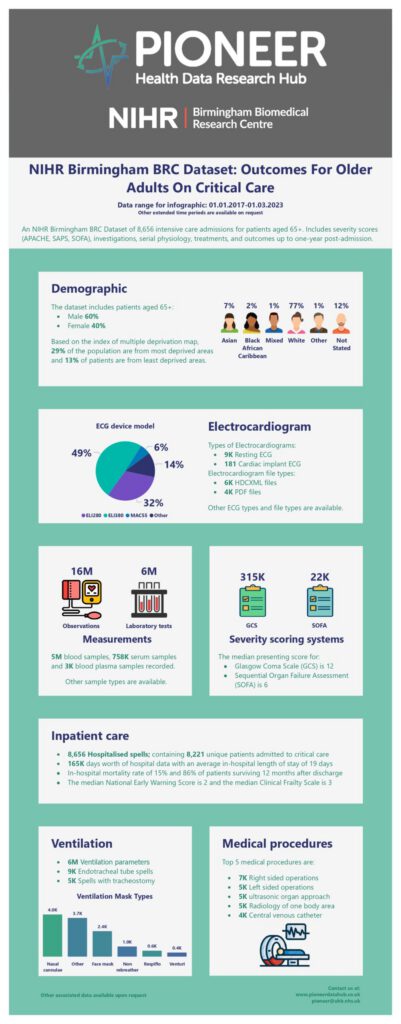
As our population ages, it is increasingly common for people presenting to hospital with critical illness to be older. Tools...
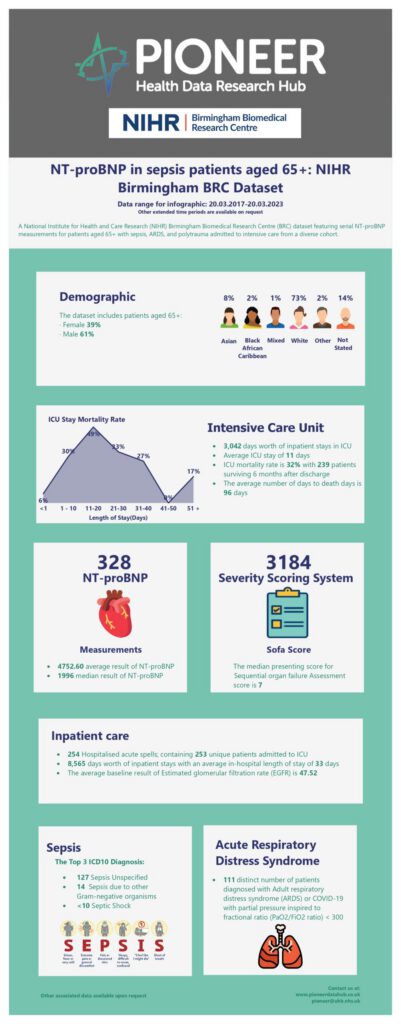
Natriuretic peptides are special proteins produced by the heart, with the two key types being BNP and NT-proBNP. NT-proBNP is...
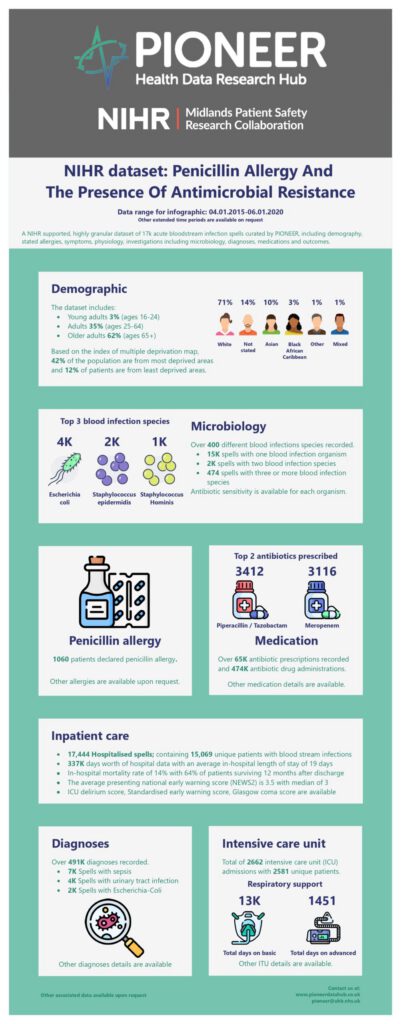
Allergy to penicillin is commonly reported. In the United Kingdom, 14% of hospitalised patients are reported to have a penicillin...
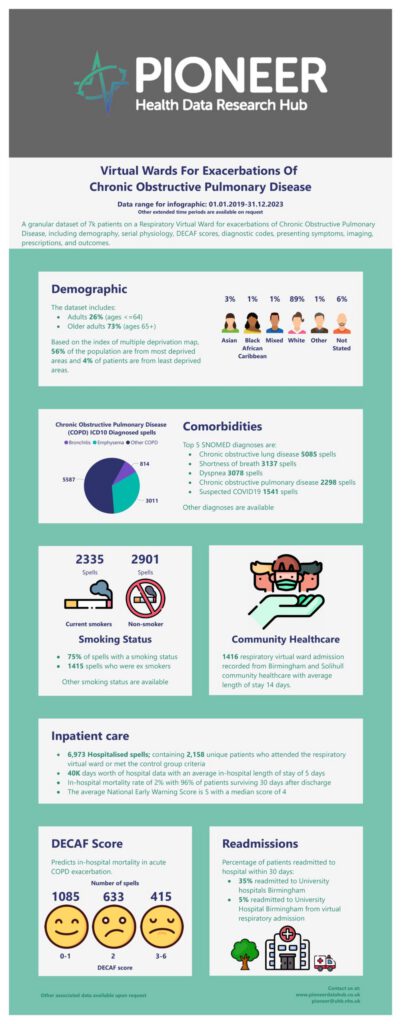
There is increasing interest in care pathways for acute exacerbations of disease, which are safe but avoid hospital admission. A...
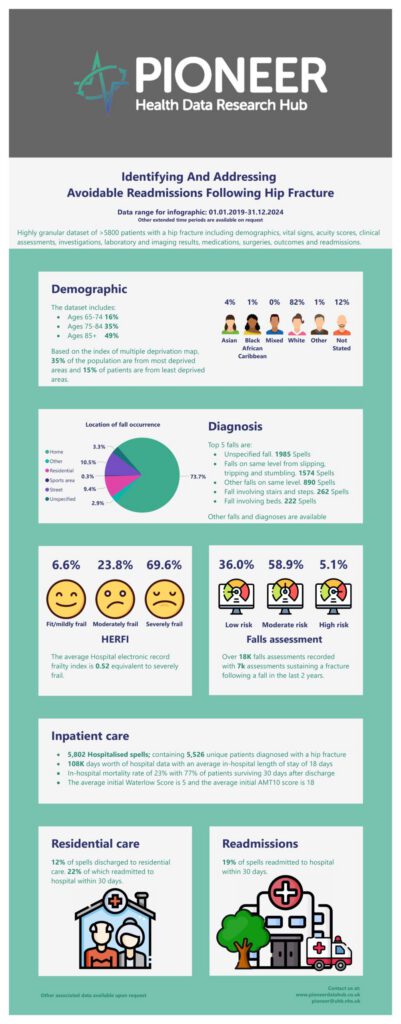
Hip fractures remain a significant public health issue, despite improvements in survival rates. While mortality has decreased, readmission rates within...
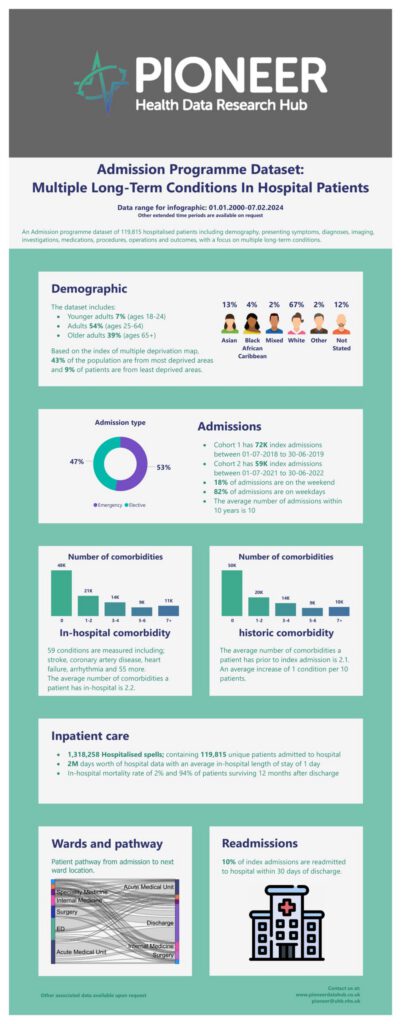
Improving outcomes for people with multiple long term conditions is a priority as set out in the NHS long term...
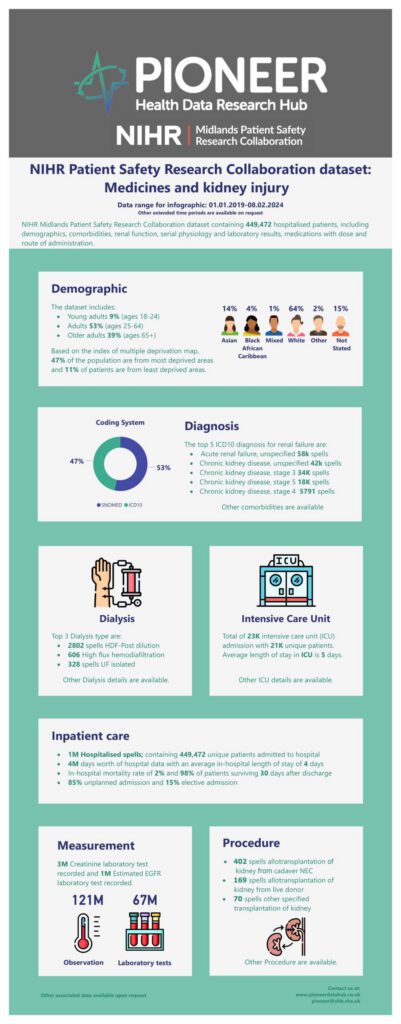
Many medications are cleared by the body through the kidneys. In people with renal impairment, this process can be slowed,...

There is increasing demand on urgent and emergency healthcare services, with rising presentations to hospital Emergency Departments. This has led...
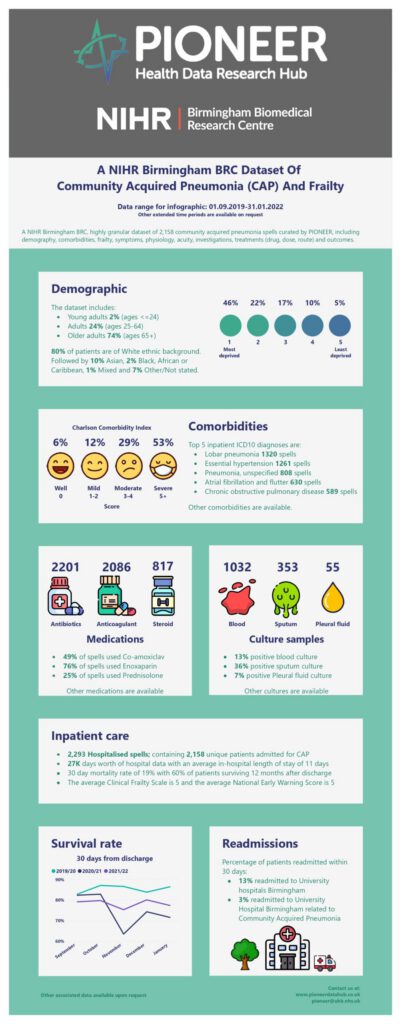
Community acquired pneumonia (CAP) is a leading cause of hospital admission and has high rates of mortality and complications, especially...
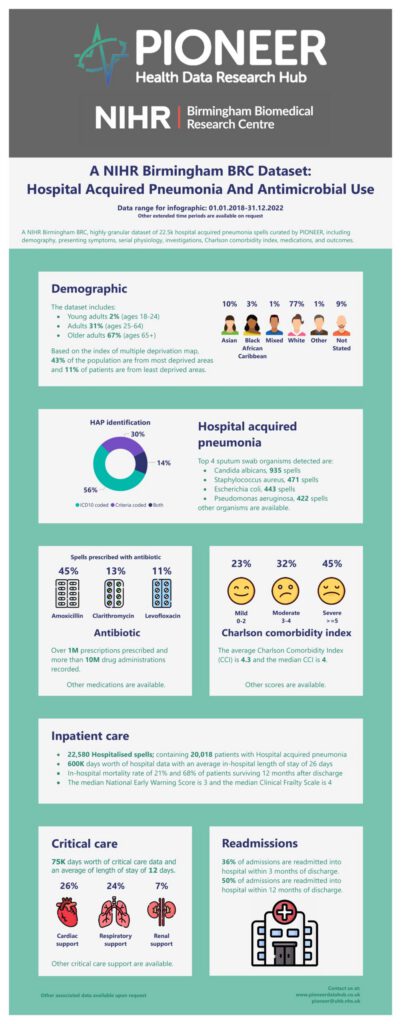
Hospital Associated Pneumonia (HAP) is a common healthcare associated infection, thought to affect 1-2% of all UK hospital admissions. Patients...
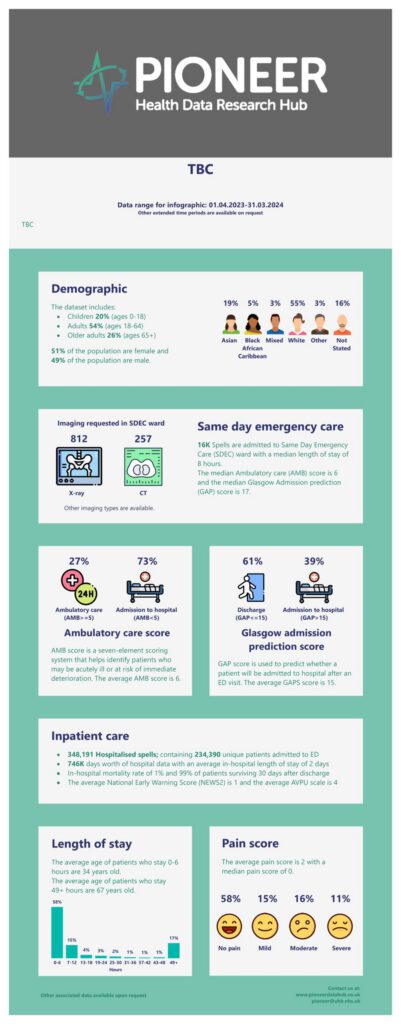
Emergency care services face increasing pressure. NHS England (NHSE) has prioritised pathways for patients which avoid admission, including Same Day...
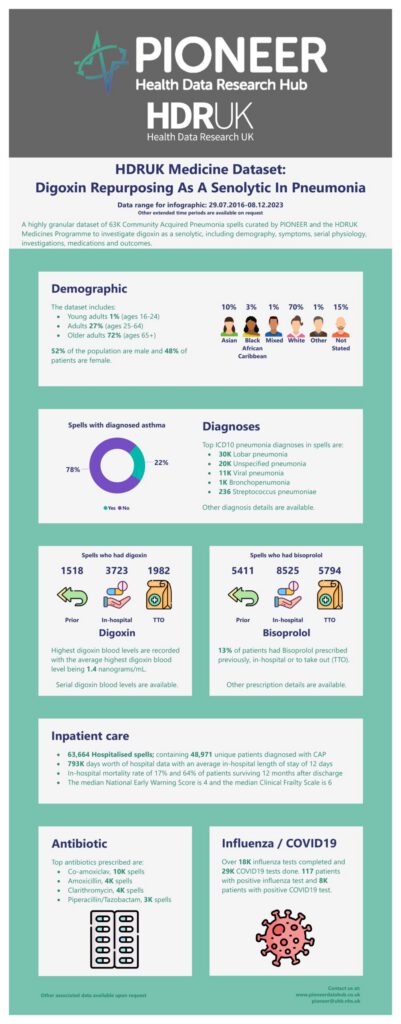
Senescence is defined as a deterioration of function with age. Senolytic drugs clear senescent (ageing) cells from the body and reduce...

Virtual wards provide care at home with remote monitoring for people who do not need admission to hospital, but require...
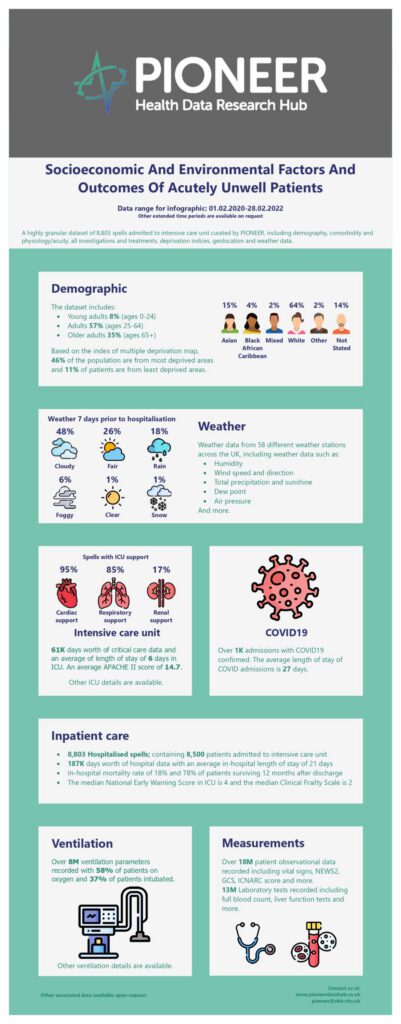
Social and environmental determinants of health are of critical importance, but are rarely captured in health data. To address this,...
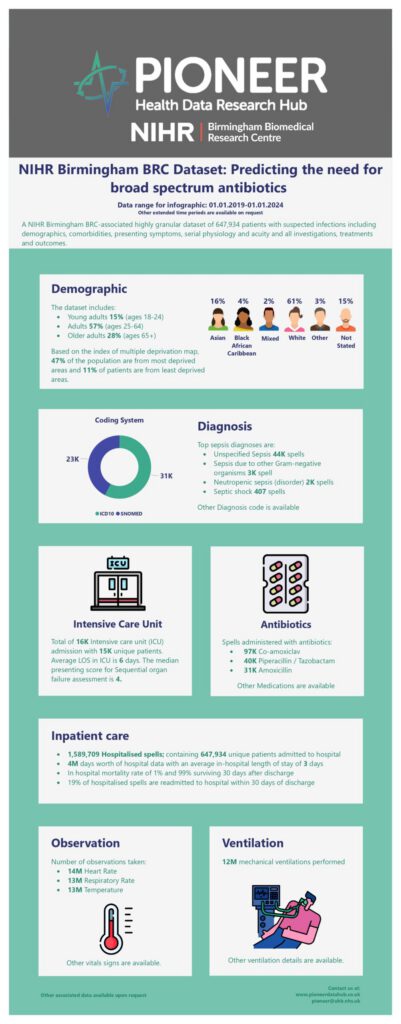
Sepsis presents a significant medical challenge with high morbidity and mortality rates, necessitating prompt and effective management. Sepsis is not...
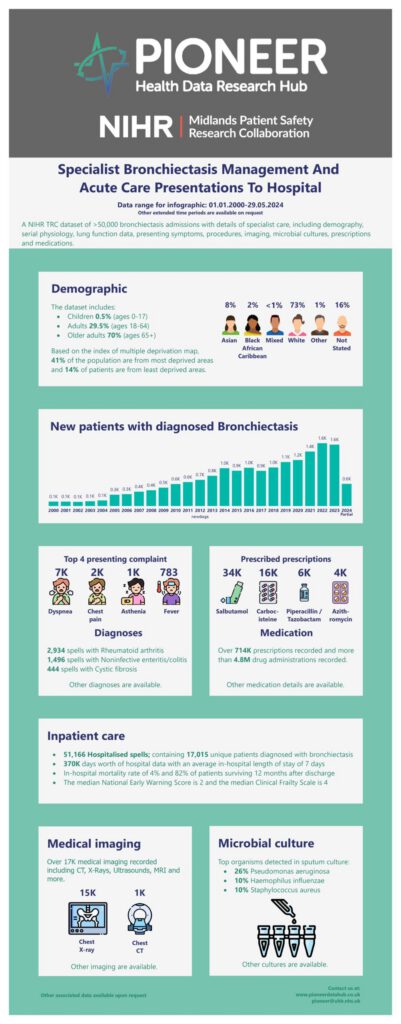
Bronchiectasis is a chronic lung condition characterised by the permanent dilation and damage of the airways, leading to frequent respiratory...
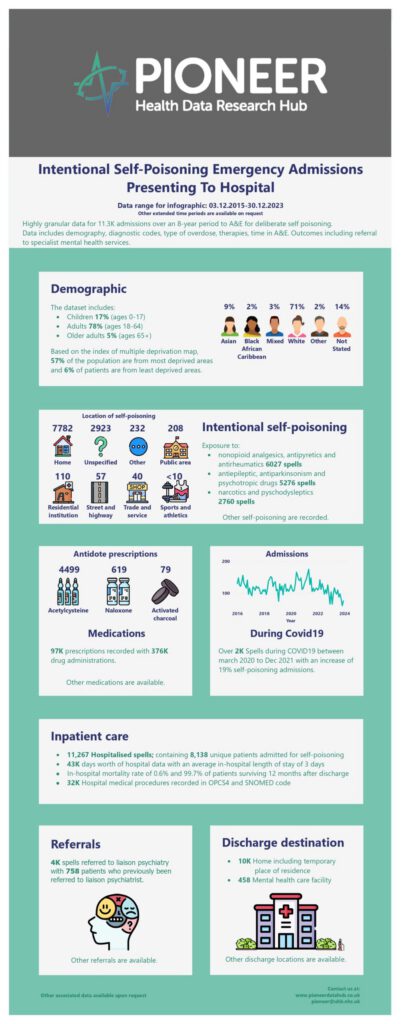
The Immune Checkpoint Inhibitor dataset (PDR47) is a highly granular and medicine-focused dataset covering approximately 1,000 patients over three years....

A highly granular dataset of 11,267 deliberate self-poisoning admissions curated by PIONEER. The data includes demography, diagnostic codes (ICD-10 &...
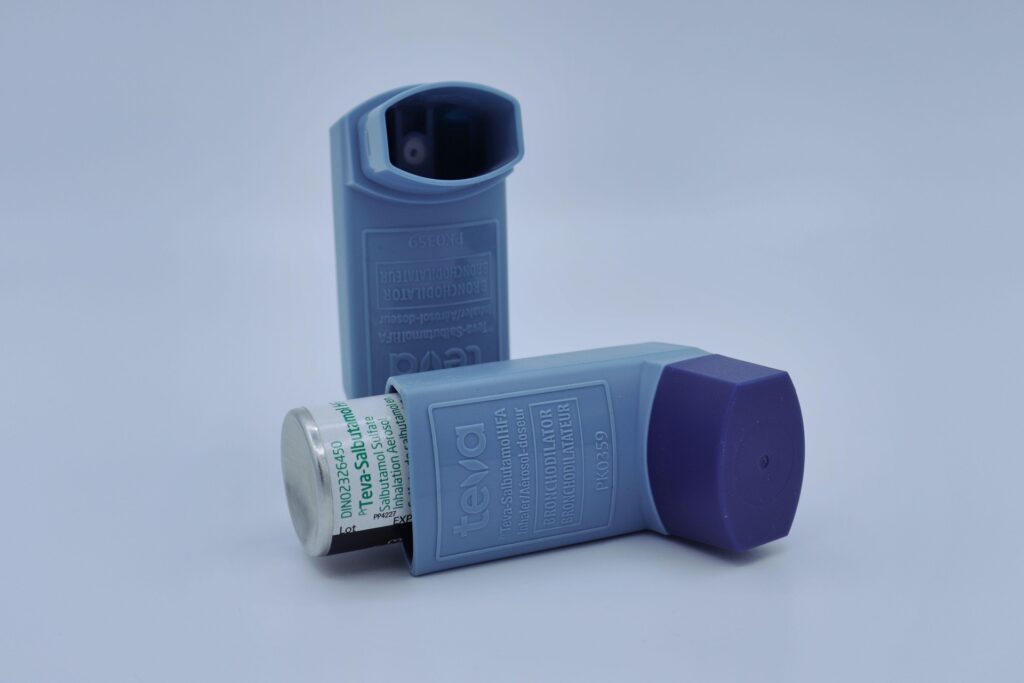
This dataset, curated by PIONEER, encompasses a detailed collection of 181,207 asthma admissions from 1st June 2016 to 31st May...
This dataset forms part of the OPTIMising therapies, discovering therapeutic targets and AI-assisted clinical management for patients Living with complex...
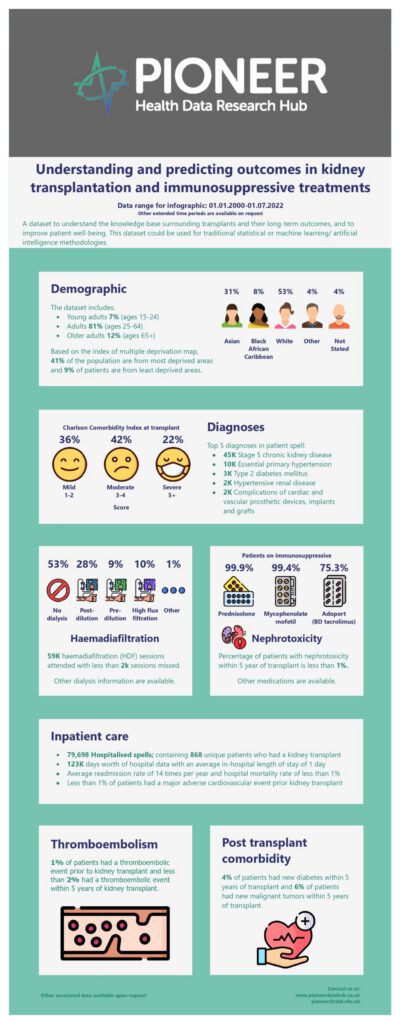
A highly granular dataset of 868 patients on immunosuppressive treatments who underwent a kidney transplant. The data includes demography, serial...
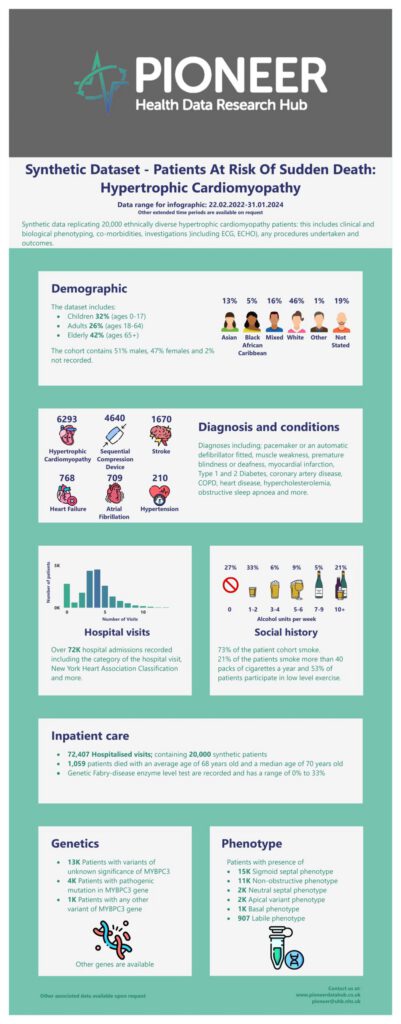
A PIONEER synthetic dataset of 20,000 ethnically diverse hypertrophic cardiomyopathy patients created using CT-GAN generative AI. Data includes clinical &...
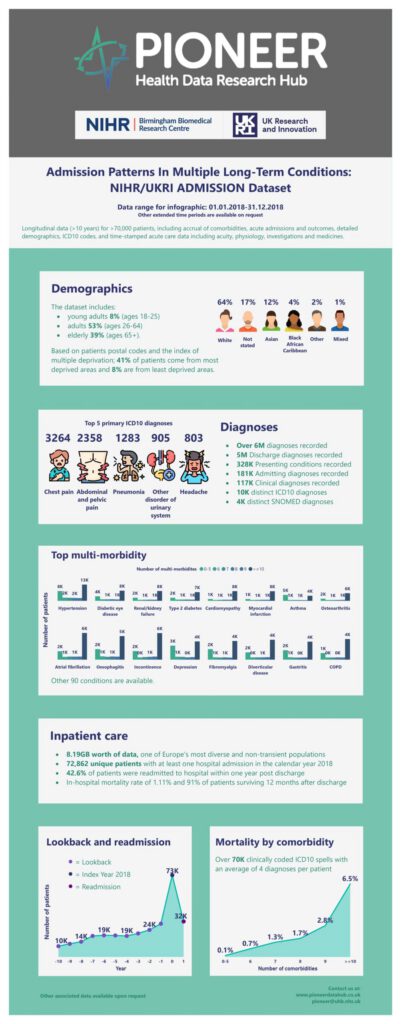
This dataset forms part of ADMISSION, the NIHR and UKRI funded programme of work to better understand and to design...
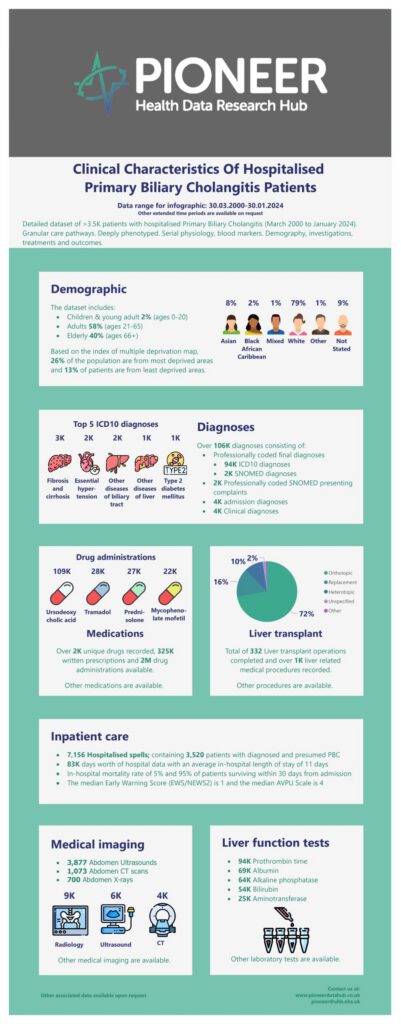
A highly granular dataset of 7,156 Primary biliary cholangitis (PBC) hospital spell admissions containing 3,520 patients curated by PIONEER. The...
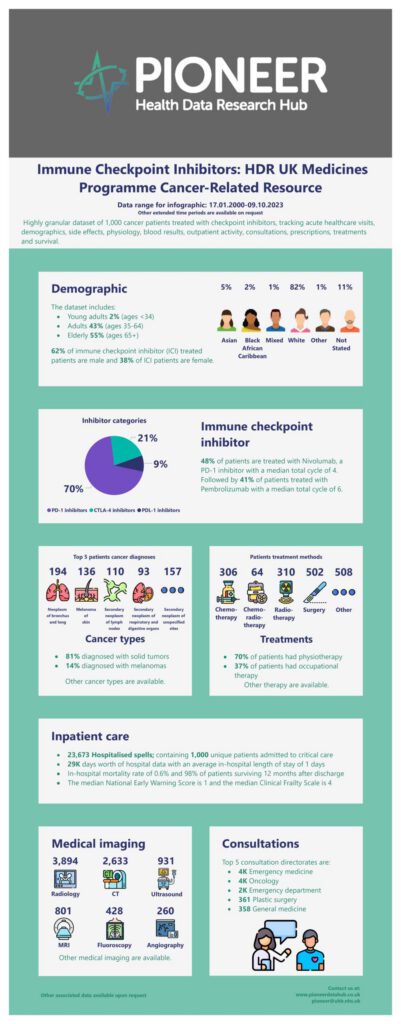
A highly granular, medicines-focused dataset of approximately 1,000 patients over 3 years. Includes patient demographics & co-morbidities taken from ICD-10...
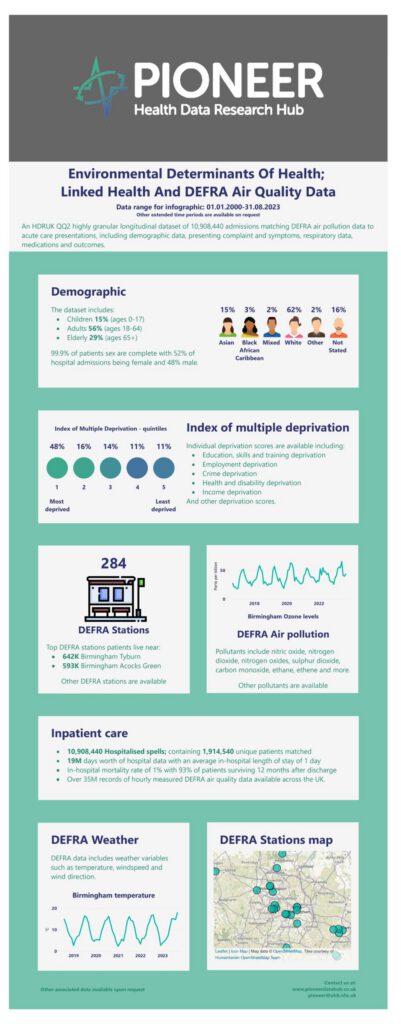
A highly granular large dataset of 10,908,440 admissions, curated by PIONEER to look at matching DEFRA’s air pollution data to...
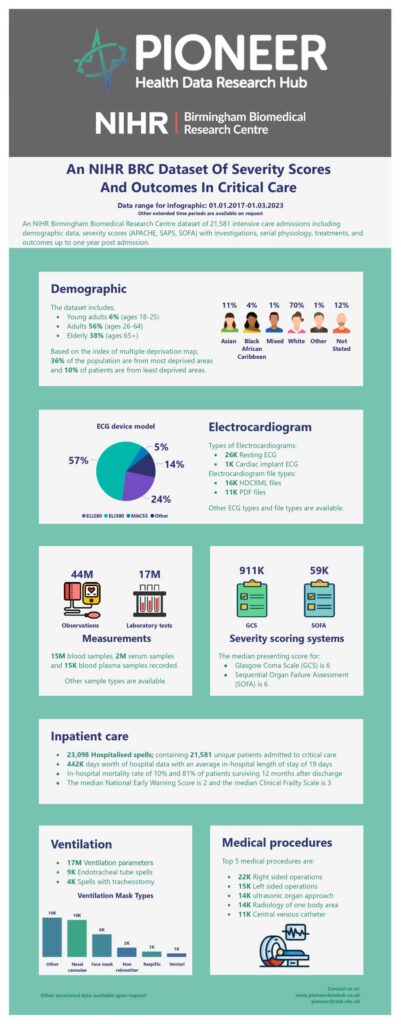
A highly granular dataset of 21,581 critical care admissions, curated by the NIHR Birmingham Biomedical Research Centre Infection and Acute...
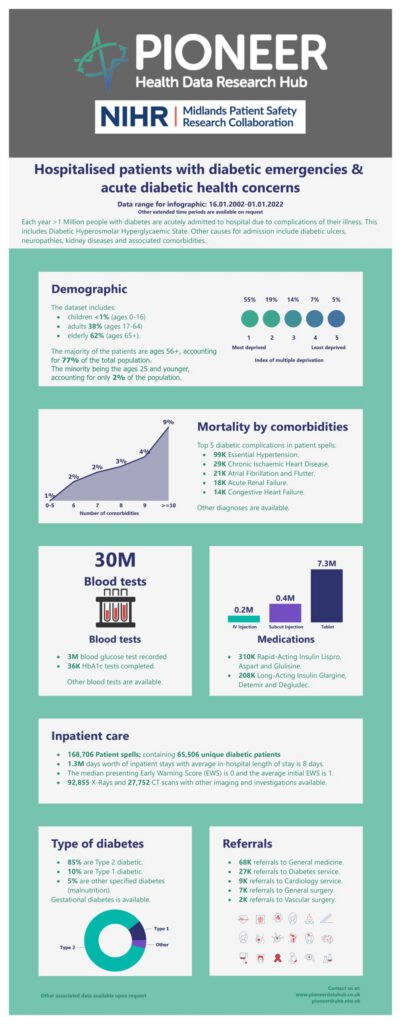
Diabetes mellitus affects over 3.9 million people in the United Kingdom (UK), with over 2.6 million people in England alone....
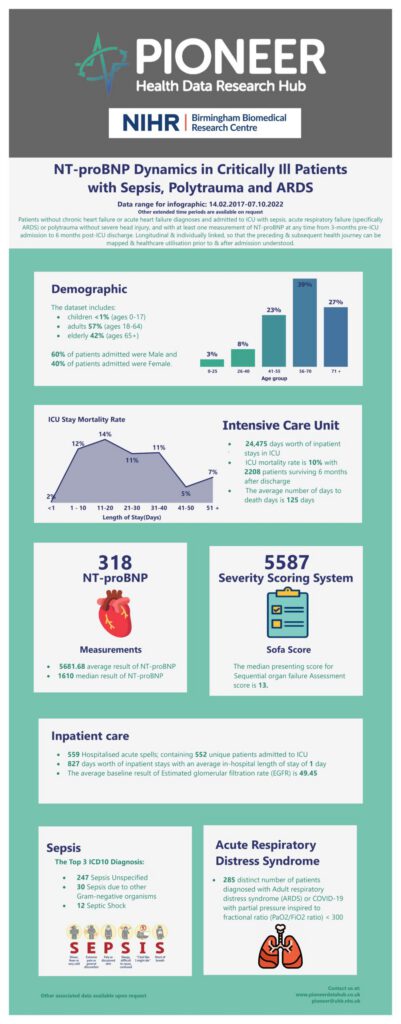
A dataset of 552 patients who have been cared for on ICU. Natriuretic peptides are special proteins produced by the...

Annually in the UK, around 60,000 people develop a pulmonary embolism (PE) and 200,000 develop a deep vein thrombosis (DVT),...
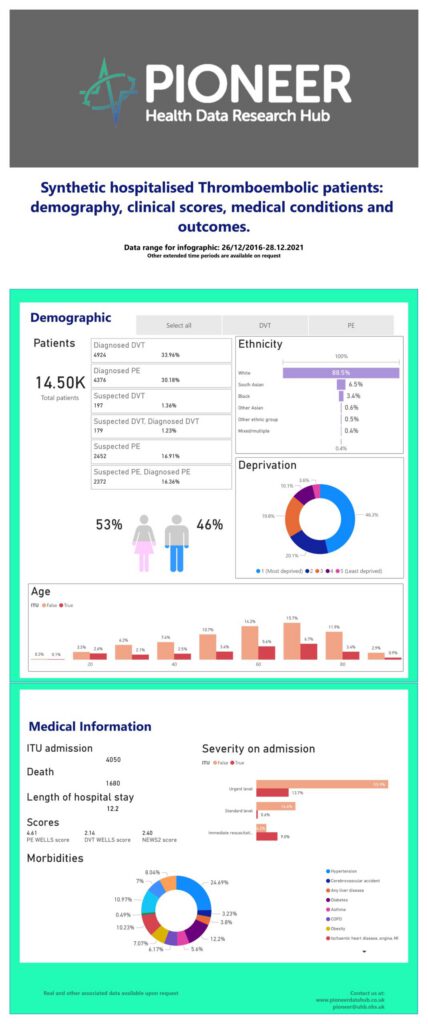
The incidence of blood clots in the lungs (pulmonary embolus or PE) or limbs (deep vein thrombosis or DVT) is estimated...
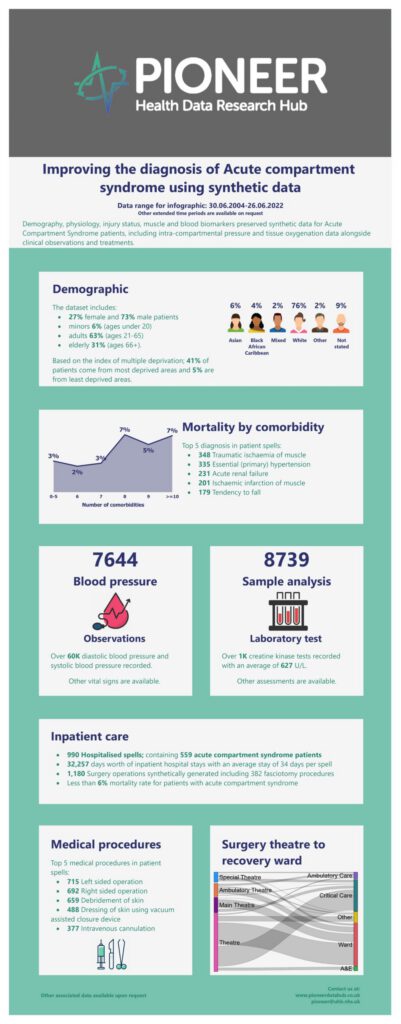
Acute compartment syndrome (ACS) is an emergency orthopaedic condition wherein a rapid rise in compartmental pressure compromises blood perfusion to...
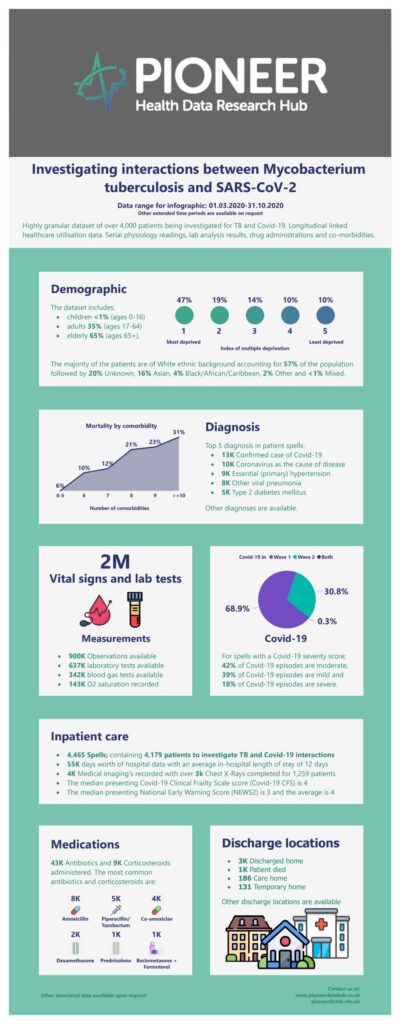
Tuberculosis (TB) remains a significant global health problem. The UK has one of the highest rates of TB in Europe,...
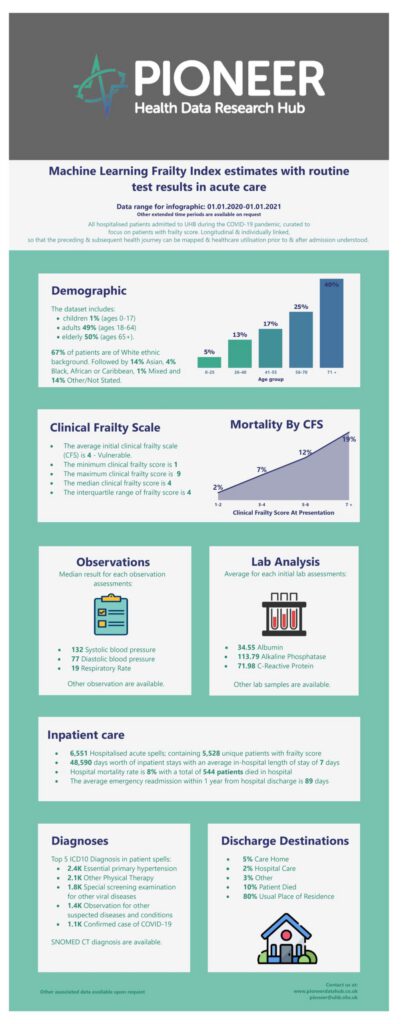
Frailty is a critical measure in health care for evidence-based clinical decision making. An accurate electronic Frailty Index (eFI) at...
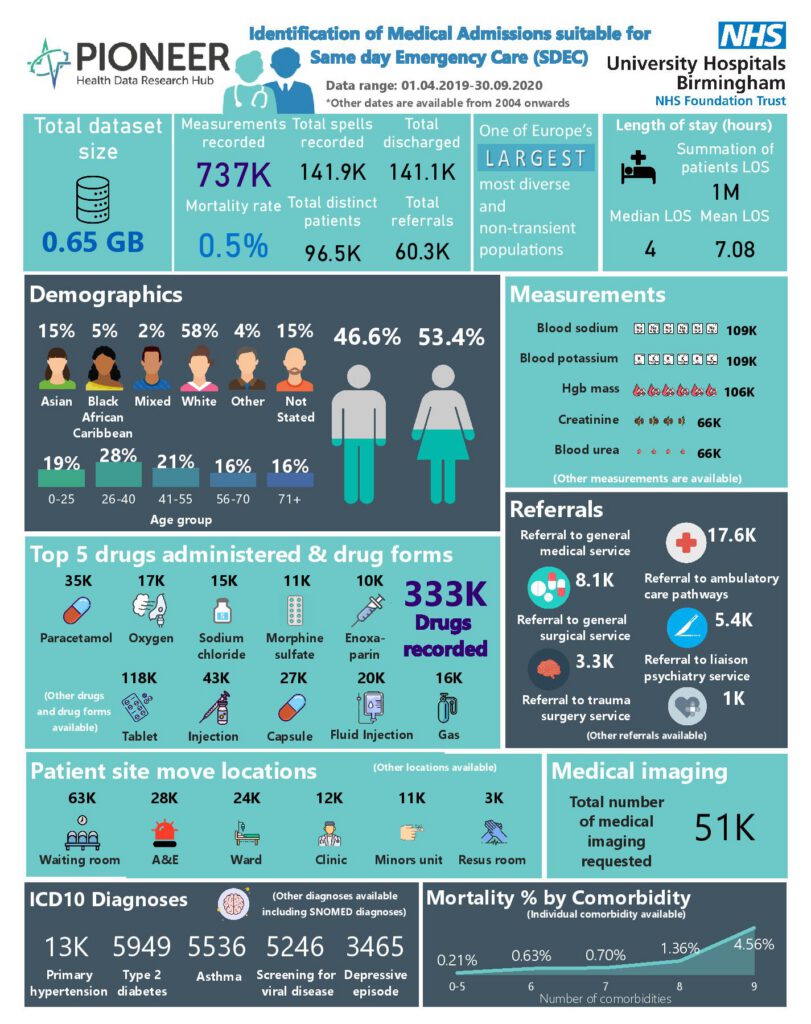
Emergency hospital admissions in the UK have been rising steadily. Medical emergencies account for the largest proportion of unplanned admissions. ...
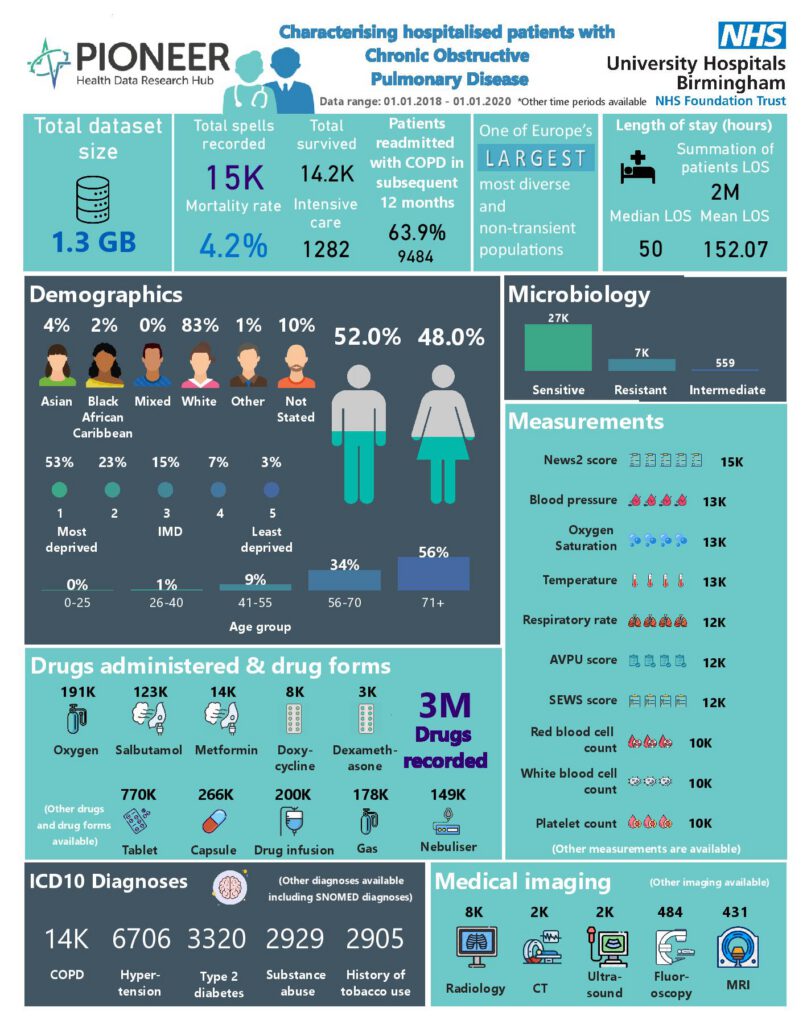
Chronic respiratory diseases remain one of the leading causes of death from non-communicable disease, with the majority of deaths due...
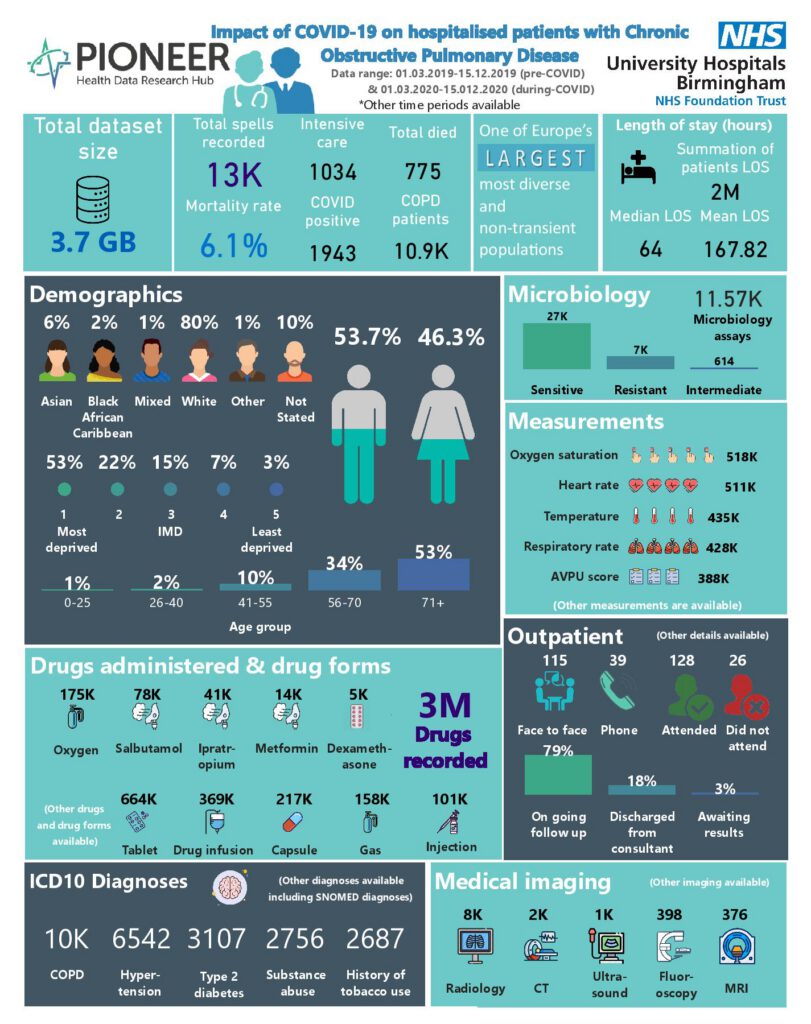
Chronic obstructive pulmonary disease (COPD) is a debilitating lung condition characterised by progressive lung function limitation. COPD is an umbrella...
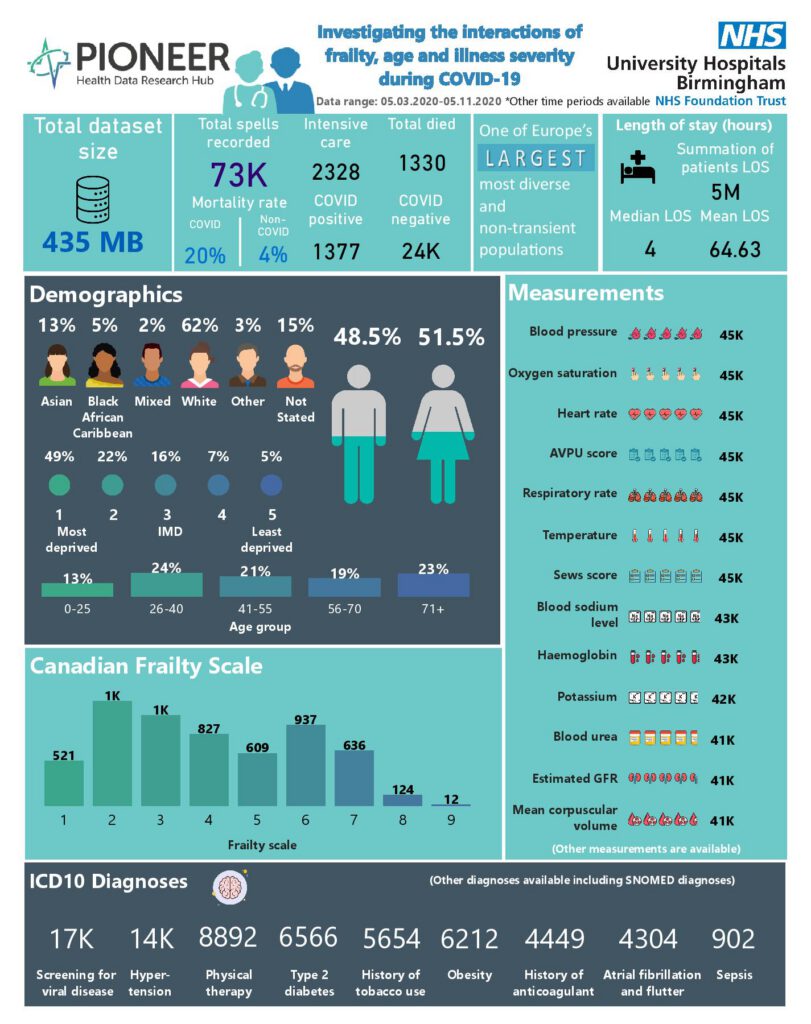
Frailty is a syndrome of increased vulnerability to incomplete resolution of homeostasis (healing or return to baseline function) following a...
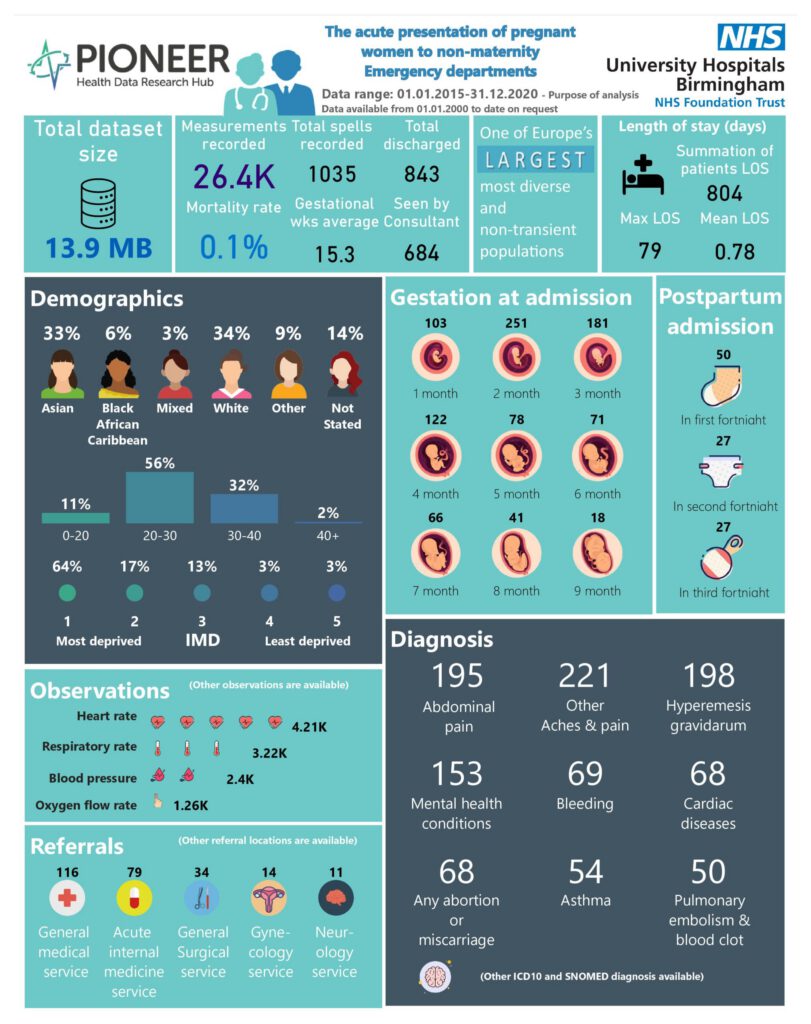
Each year, there are audits to assess maternal and foetal outcomes across the UK. In 2016-18, 217 women died during or...
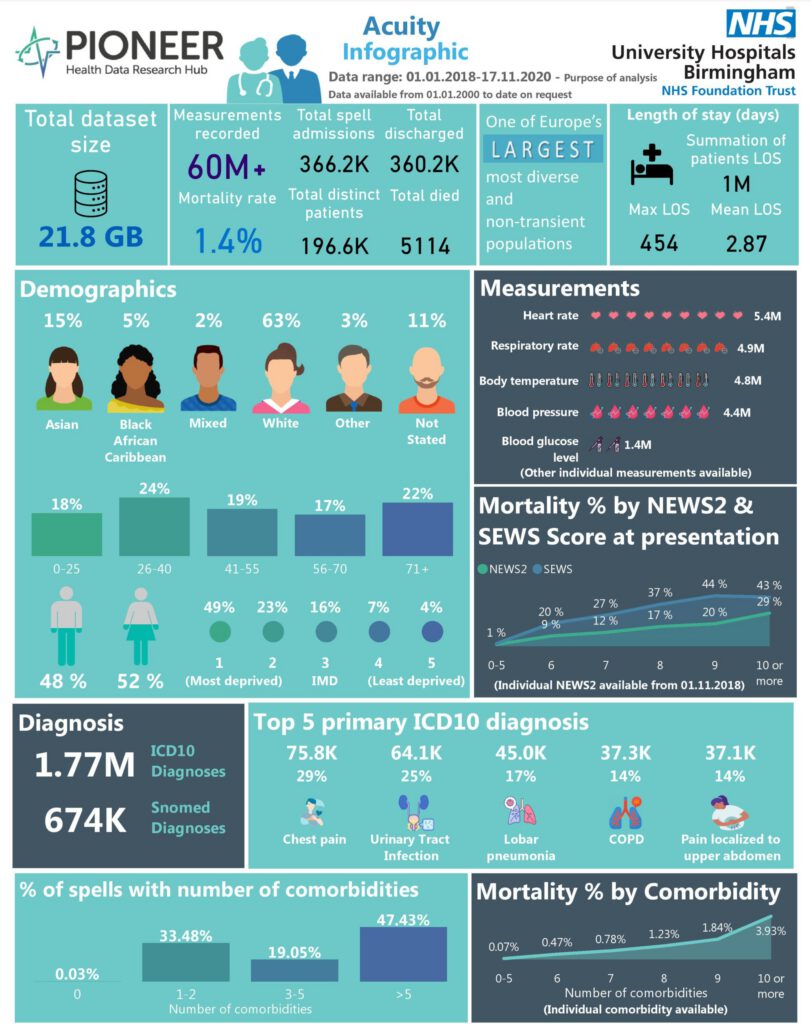
Early warning systems (EWS) are bedside tools used to assess basic physiological parameters to identify patients with potential or established...
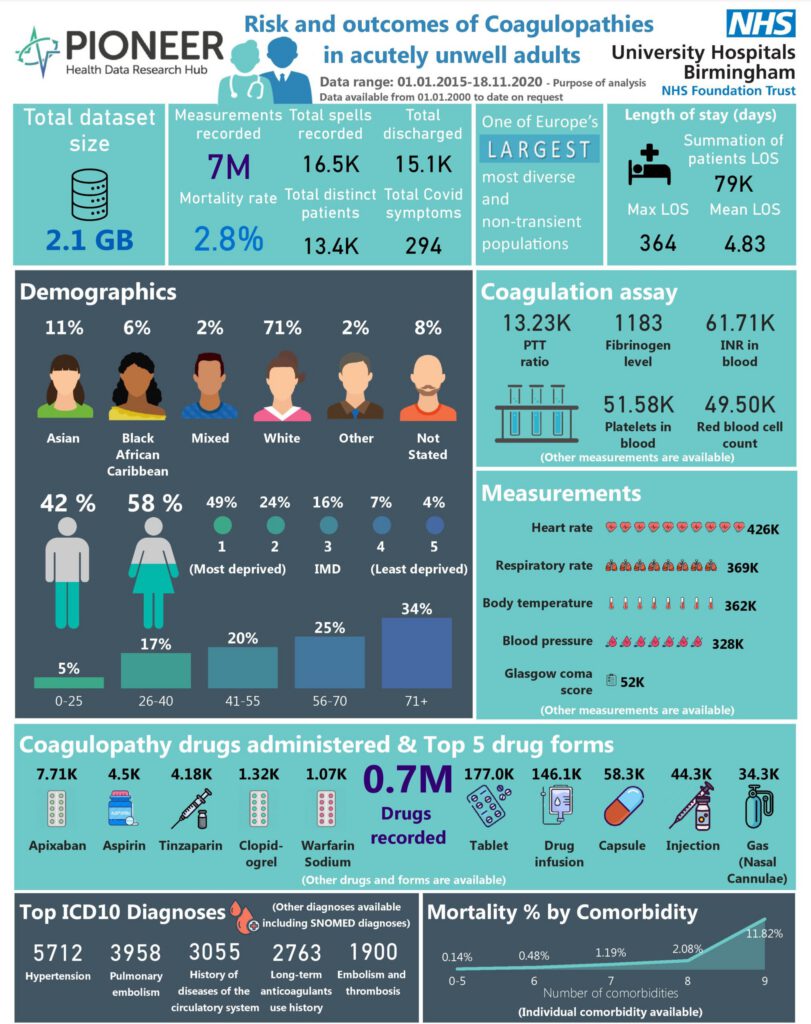
Coagulopathies and bleeding disorders can reflect hereditary conditions such as Haemophilia or von Willebrand disease, be associated with other diseases...

Acute respiratory failure is commonly encountered in the emergency department (ED). Early treatment can have positive effects on long-term outcome....
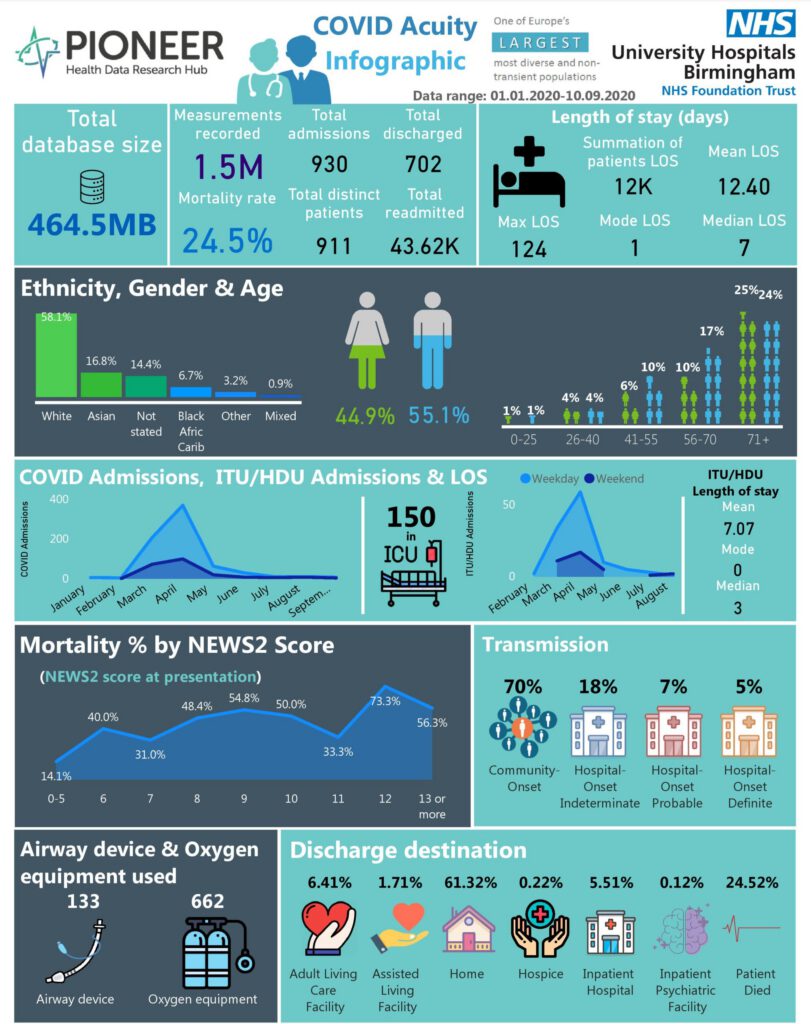
Some individuals experience severe manifestations of Covid-19 infection, including viral pneumonia, adult respiratory distress syndrome (ARDS) and death. There is...
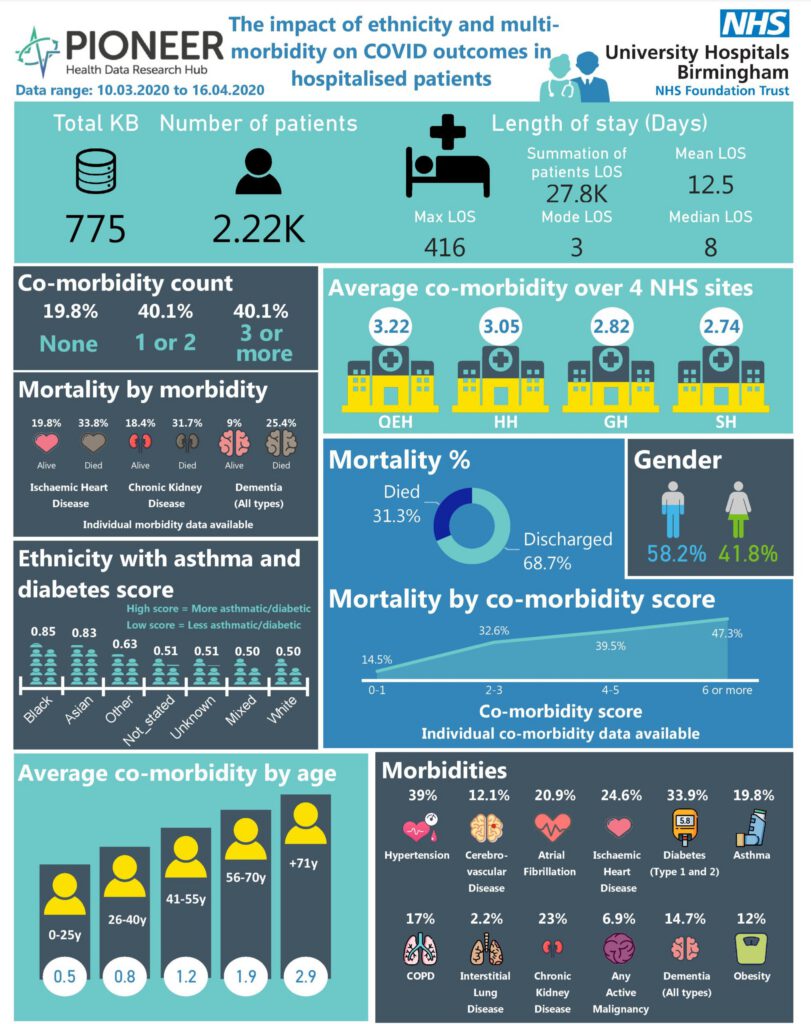
Evidence suggests that older patients, those from some ethnic minority groups and those with multiple long-term health conditions have worse...
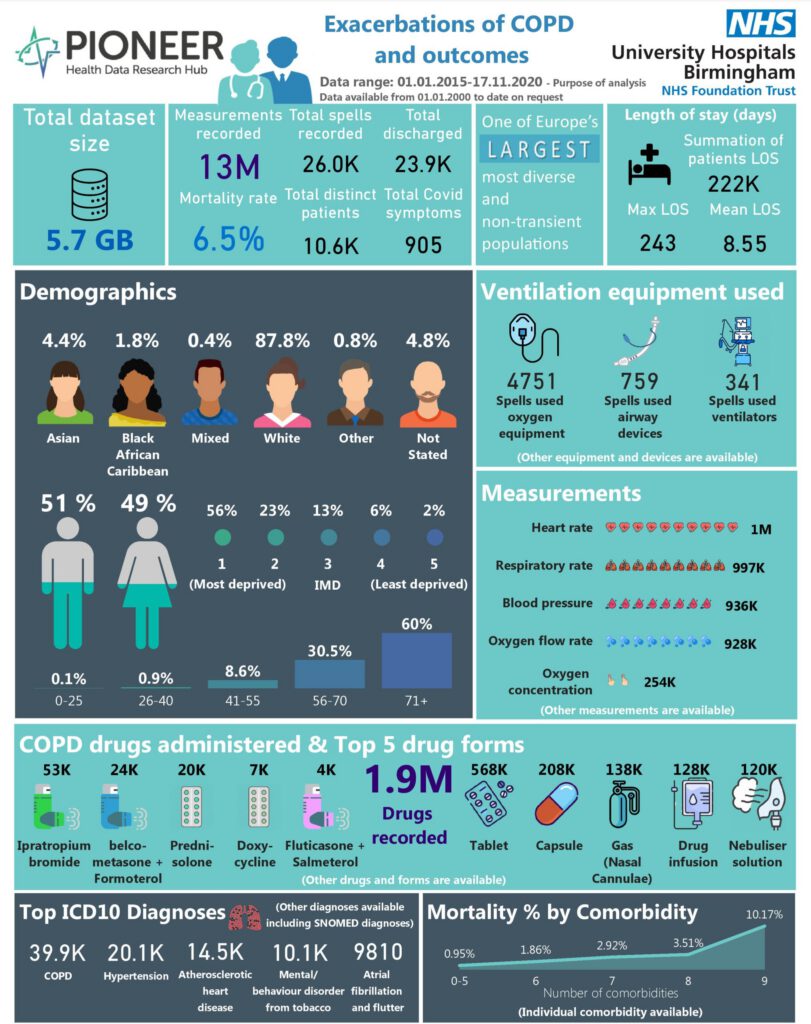
Chronic obstructive pulmonary disease (COPD) is a debilitating lung condition characterised by progressive lung function limitation. COPD is an umbrella...
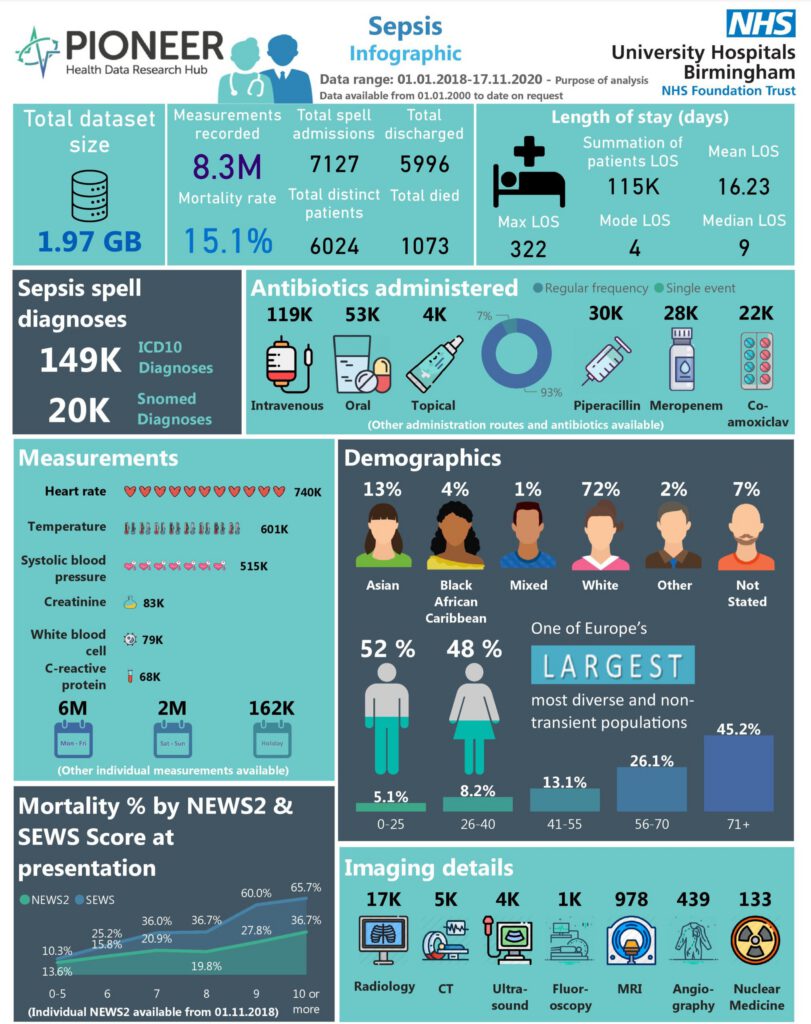
Sepsis is life-threatening organ dysfunction due to a dysregulated host response to infection & is a global health challenge. In...
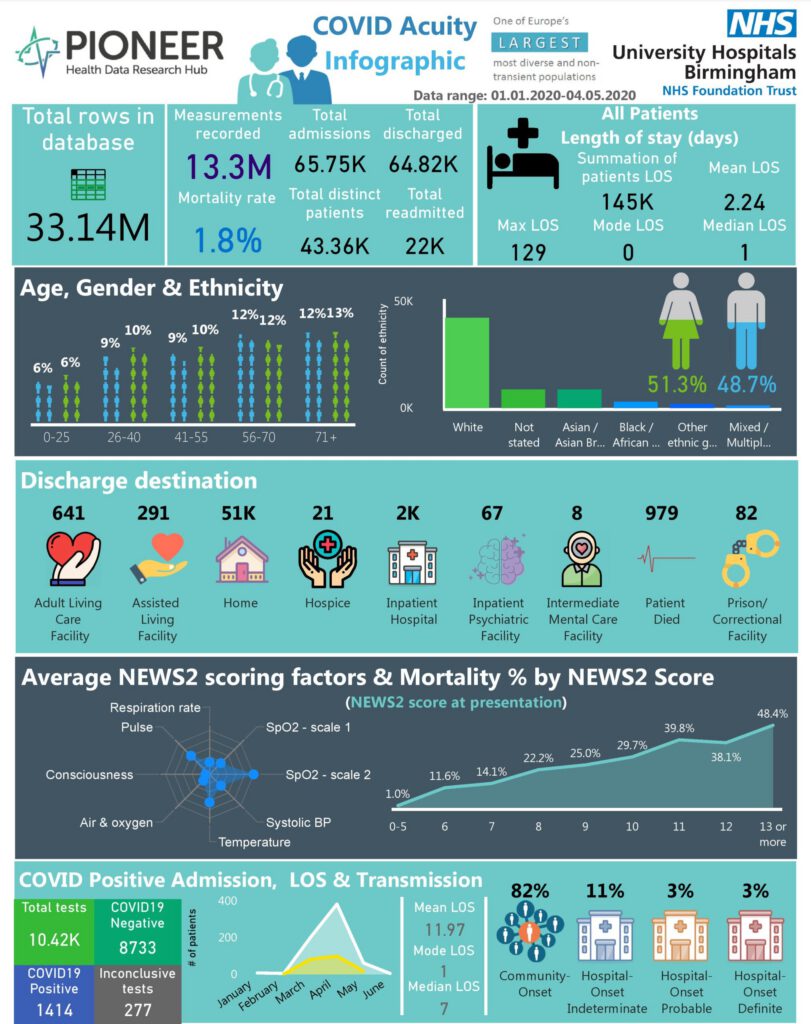
Coronavirus disease 2019 (COVID-19) was identified in January 2020. Currently, there have been more than 6 million cases& more than...
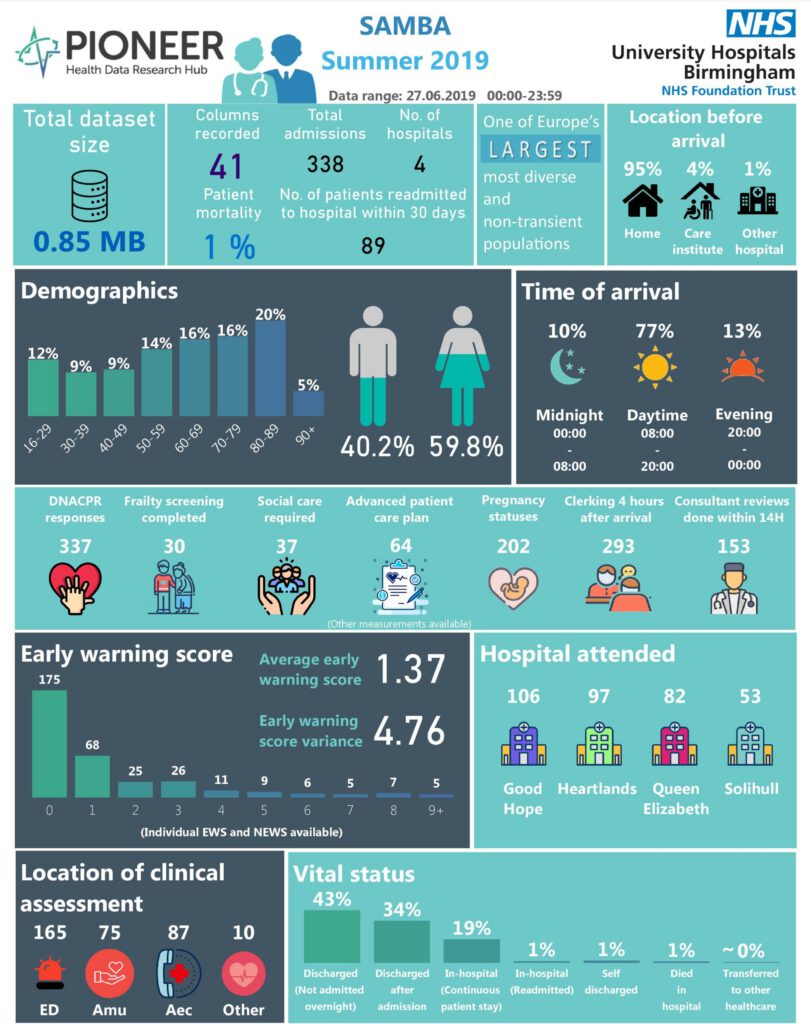
The Society for Acute Medicine (SAM) Benchmark Audit (SAMBA) is a national benchmark audit of acute medical care. The aim...
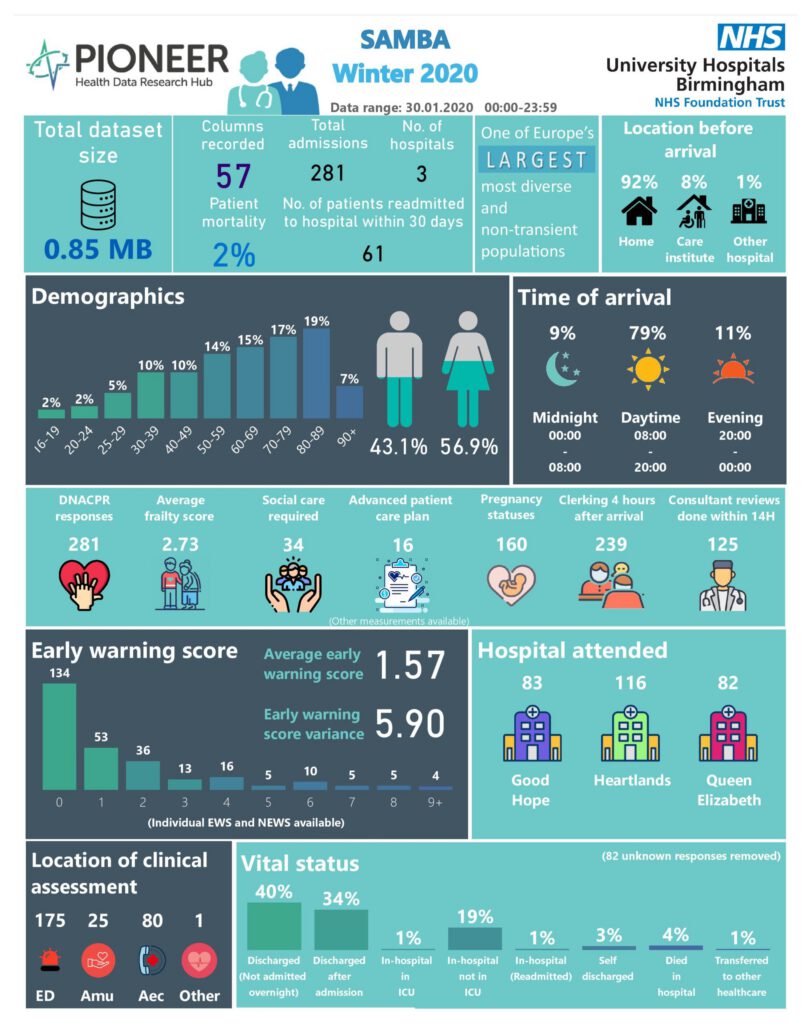
The Society for Acute Medicine (SAM) Benchmark Audit (SAMBA) is a national benchmark audit of acute medical care. The aim...
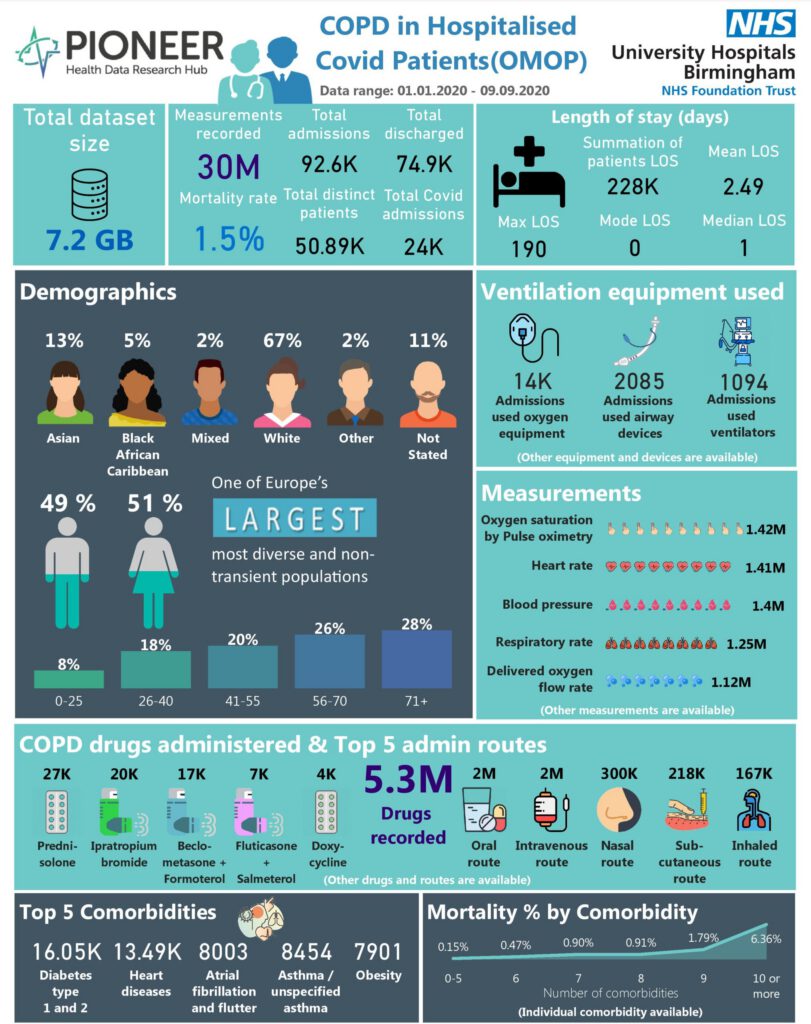
Chronic obstructive pulmonary disease (COPD) is a debilitating lung condition characterised by progressive lung function limitation. COPD is an umbrella...
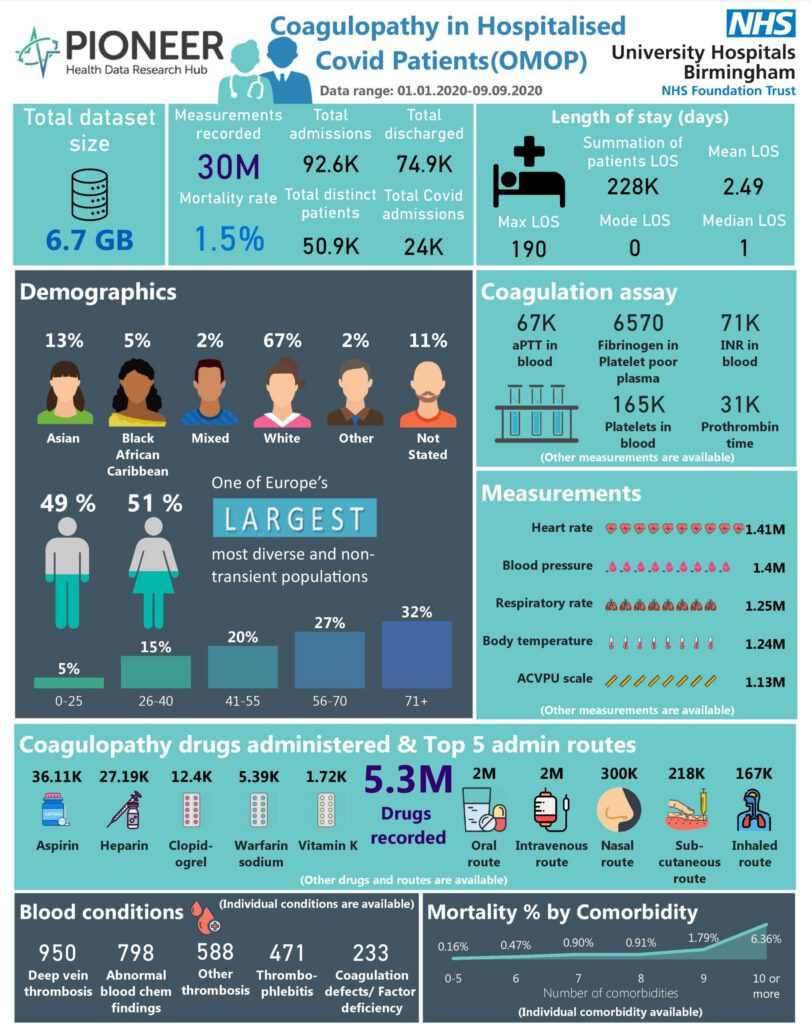
In December 2019, the first case of severe acute respiratory syndrome coronavirus 2 (SARS-COV-2) was described and by March 2020,...
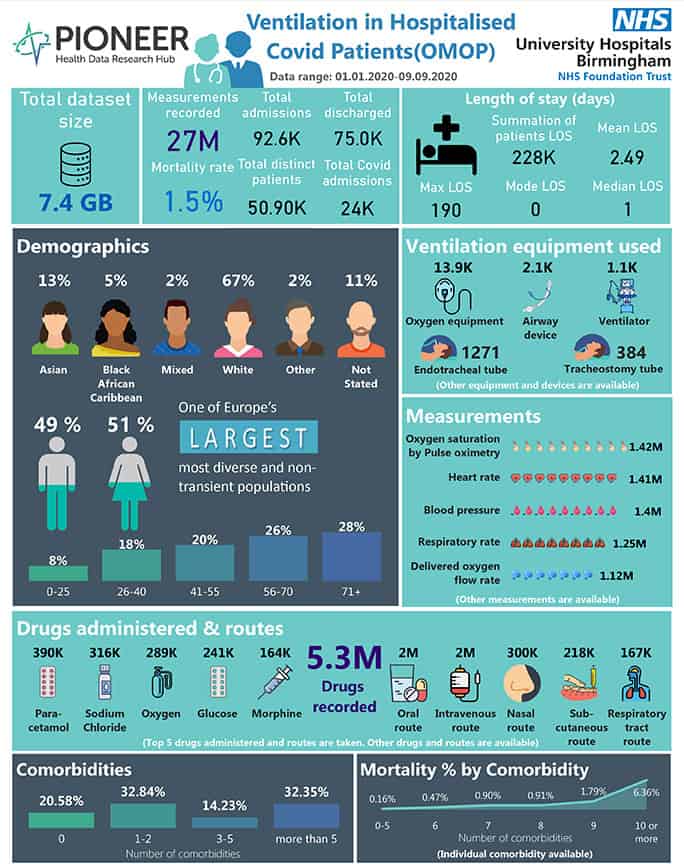
Coronavirus disease 2019 (COVID-19) was identified in January 2020. Currently, there have been more than 6 million cases & more...


